Bodyweight exercises are one of the most versatile and convenient strength training tools for working major muscle groups like arms, shoulders, back, chest, core, and legs.
Bodyweight training builds lean muscle, boosts metabolism, burns calories, and sculpts an athletic physique.
With no equipment besides your body weight, you can achieve a toned physique at home or anywhere.
This guide will provide you with an overview of over 100 of the best bodyweight exercises to target each muscle group for beginners and advanced fitness levels.
With clear images and easy-to-follow instructions, you’ll learn proper form and techniques to get the best results.
Save or bookmark this illustrated bodyweight workout guide.
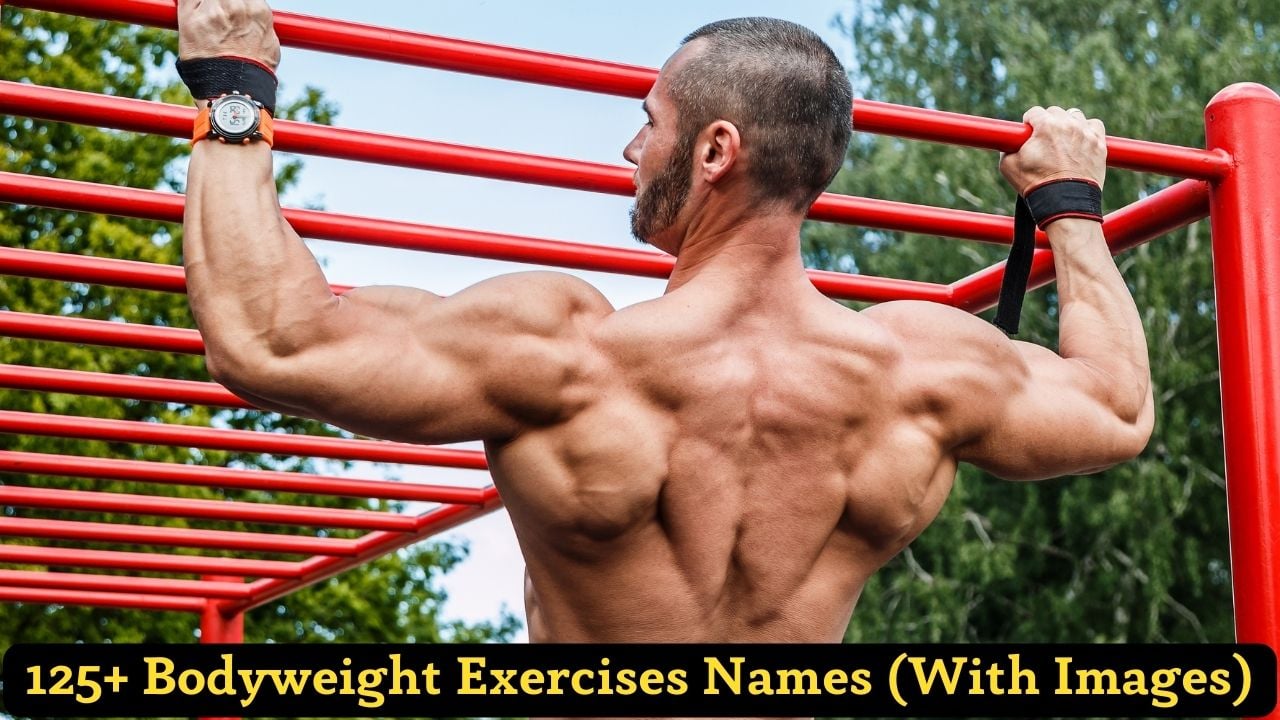
- Bodyweight Chest Exercises With Image
- 1. Wall Push Up
- 2. Knee Push Up
- 3. Incline Push-Ups
- 4. Standard Push-Ups
- 5. Close Grip Push-Ups
- 6. Wide Push Up
- 7. Decline Push-Up
- 8. Parallel Bar Dip (Chest Dip)
- 9. Spider-Man Push-Up
- 10. Shoulder Tap Push Up
- 11. Hindu Push-Up
- 12. Alternate Punching
- 13. Diamond Push Up
- 14. Single-Leg Push Up
- 15. Clapping Push-Up
- 16. T Push Up
- Name Of Bodyweight Back Exercises
- 1. Pull-Up
- 2. Chin Ups
- 3. Neutral-Grip Pull-Ups
- 4. Inverted Row
- 5. Superman
- 6. Good Morning
- 7. Hip Bridge
- 8. Flat Bench Hyperextension
- 9. Bird Dog
- 10. Cat Cow
- 11. High Reverse Plank
- 12. Bodyweight Shrugs
- 13. Commando Pull-Ups
- 14. Behind-The-Neck Pull-Ups
- 15. Muscle-Up
- 16. Cobra Pose
- Name Of Bodyweight Shoulder Exercises
- 1. Pike Push Up
- 2. Plank To Push-Up
- 3. Tabletop Reverse Pike
- 4. Crab Walk
- 5. Archer Push-Up
- 6. Stability Ball Push Up
- 7. High Reverse Plank
- 8. Elevated Pike Push-Up
- 9. Bear Crawl
- 10. Arm Circles
- 11. Wall Walk
- 12. Scapular Wall Slides
- 13. Alternating Superman Plank And Reach
- 14. Lateral Plank Walk
- 15. Scapula Push Ups
- 16. Handstand Push Up
- Name Of Bodyweight Bicep Exercises
- 1. Chin Up
- 2. Reverse Grip Push-Ups
- 3. V-Grip Pull Up
- 4. Bodyweight Bicep Curl
- 5. Rope Climber
- 6. Renegade Row
- 7. Towel Bicep Curl
- 8. Reverse grip Inverted Row
- Bodyweight Tricep Exercises With Image
- 1. Bench Dip
- 2. Diamond Push-Up On Knees
- 3. Kneeling Bodyweight Triceps Extension
- 4. Close Grip Push-Ups
- 5. Bench Dip With Elevated Legs
- 6. Parallel Bar Triceps Dip
- 7. One Arm Bench Dip
- 8. Close-Grip Medicine Ball Push-Up
- 9. Stability Ball Push Up
- 10. Single Dumbbell Push Ups
- 11. Cross Arm Push Up
- 12. Bodyweight Skull Crusher
- 13. Tricep Floor Dip
- 14. Bosu Push Up
- 15. One-Arm Push-Up
- 16. Side Push Up
- Bodyweight Leg Exercises Names
- 1. Bodyweight Squat
- 2. Bodyweight Sumo Squat
- 3. Lunges
- 4. Step Up
- 5. Jump Squat
- 6. Inverse Leg Curl
- 7. Hip Thrust
- 8. Bulgarian Split Squat
- 9. Jumping Rope
- 10. Box Jump
- 11. Squat Hold Calf Raises
- 12. Bodyweight Standing Calf Raise
- 13. Donkey Calf Raises
- 14. Pistol Squats
- 15. Wall Squat
- 16. Kneeling Leg Extension
- 17. Side Lunge
- 18. Seated Knee Extension
- Name Of Bodyweight Abs Exercises At Home
- 1. Crunch
- 2. Bicycle Crunch
- 3. V-Up
- 4. Mountain Climber
- 5. Russian Twist
- 6. Lying Straight Leg Raise
- 7. Reverse Crunch
- 8. Oblique Crunches
- 9. High Knee
- 10. Plank
- 11. Side Plank
- 12. Lying Bent-Knee Oblique Twist
- 13. Cross-Body Mountain Climber
- 14. Alternate Heel Touch
- 15. Inchworm
- 16. Seated Knee Up
- 17. Dead Bug
- 18. Flutter Kick
- 19. Scissor Kicks
- 20. Toe Touch
- 21. Sit-Ups
- 22. Elbow To Knee Side Plank Crunch
- 23. Forearm Side Plank Crunch
- 24. Plank Jack
- 25. Standing Side Crunch
- 26. Plank To Toe Touch
- 27. Bench Oblique Crunch
- 28. Dragon Flag
- 29. Seated Alternating Knee Tuck
- 30. 21 Crunch
Bodyweight Chest Exercises With Image
While weight training builds immense chest strength, you should not underestimate callisthenics training.
Bodyweight exercises can help you strengthen your muscles and improve your stability.
Push-ups may be king, but dozens of challenging bodyweight moves target the chest from all angles.
Here is a list of 15 of the best chest exercises, with images that illustrate the precise body positioning for each move.
1. Wall Push Up
Wall push-up is a variation of the traditional exercise designed for beginners or those with limited upper body strength.
This exercise engages the chest, shoulders, and triceps, helping to build strength in these areas.
The closer you are to the wall, the easier this push-up will be, but remember to keep your body alignment in mind when you do it.
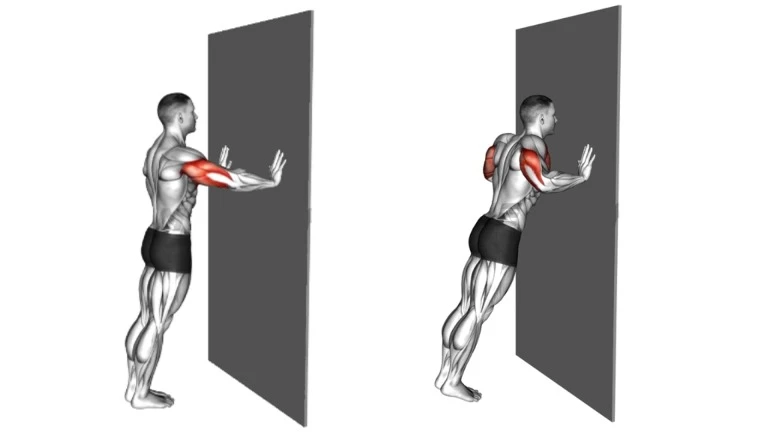
2. Knee Push Up
The knee push-up, a modified push-up, is a bodyweight chest exercise that works for muscle groups throughout your upper body.
Beginners should add these bodyweight exercises to their at-home chest workout routine.
If you’re having trouble performing a full push-up, practice an easier push-up variation, the knee push-up.
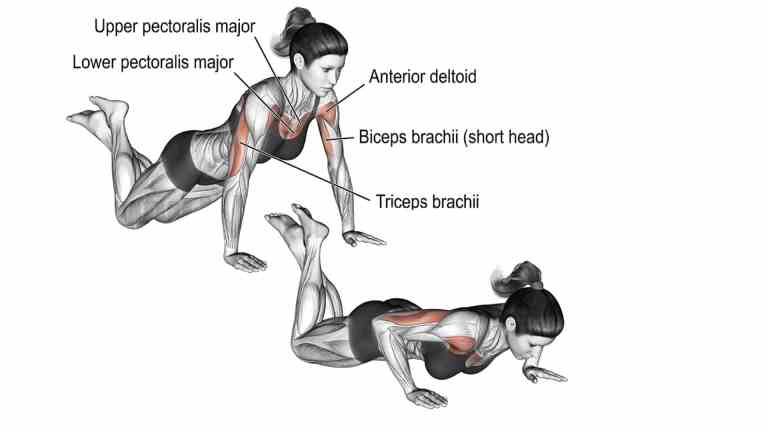
3. Incline Push-Ups
The incline push-up is a variation of the classic push-up that involves elevating your hands on a bench, chair, or other sturdy surface.
The inclined position emphasises the lower portion of your chest muscles. You can do it anywhere, and it’s free. You don’t need expensive equipment.
You only need a stable surface like a table, desk, or wall.
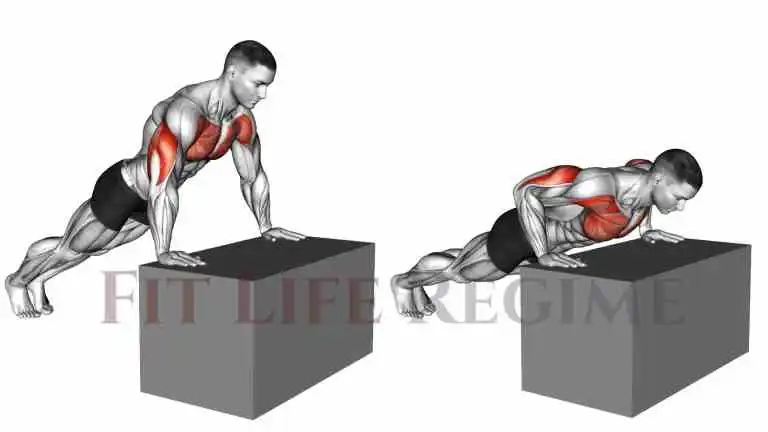
4. Standard Push-Ups
The press-up or push-up exercise is standard for strengthening the upper extremities. It is a closed kinetic chain exercise that requires no tools and uses the body weight as resistance.
The standard push-up is undoubtedly one of the best bodyweight chest exercises.
They work the triceps, pectoral, and shoulders. With proper form, they can strengthen the lower back and core muscles.
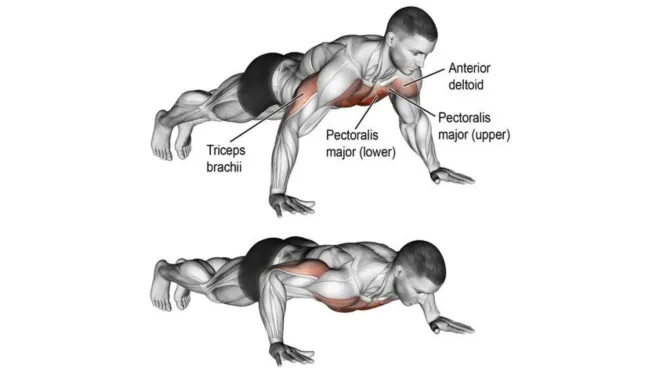
5. Close Grip Push-Ups
Narrow grip push-ups are the best bodyweight workout for building your entire upper body, including shoulders, chest, and triceps. It’s one of the best inner chest exercises you can do at home.
This is evidenced by a study that found greater electromyography (EMG) activity in the triceps brachii and inner chest when doing close push-ups compared to when executing regular push-ups.
Close-grip push-ups can be challenging, so it’s important to start with a modified version (knee push-ups) if needed.
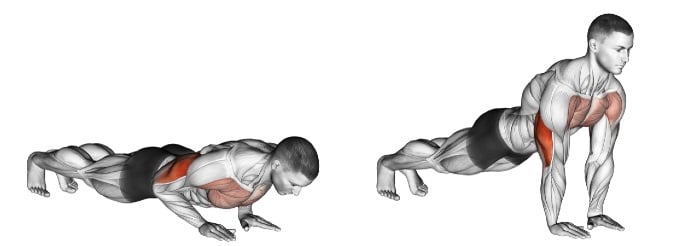
6. Wide Push Up
If you’ve mastered regular pushups and want to target your muscles differently, Wide pushups are a good option.
Wide pushups target your chest and shoulder muscles more than standard pushups because you position your hands farther apart.
For a simpler version, you can do a wide-hand knee push-up, also called a modified type push-up.
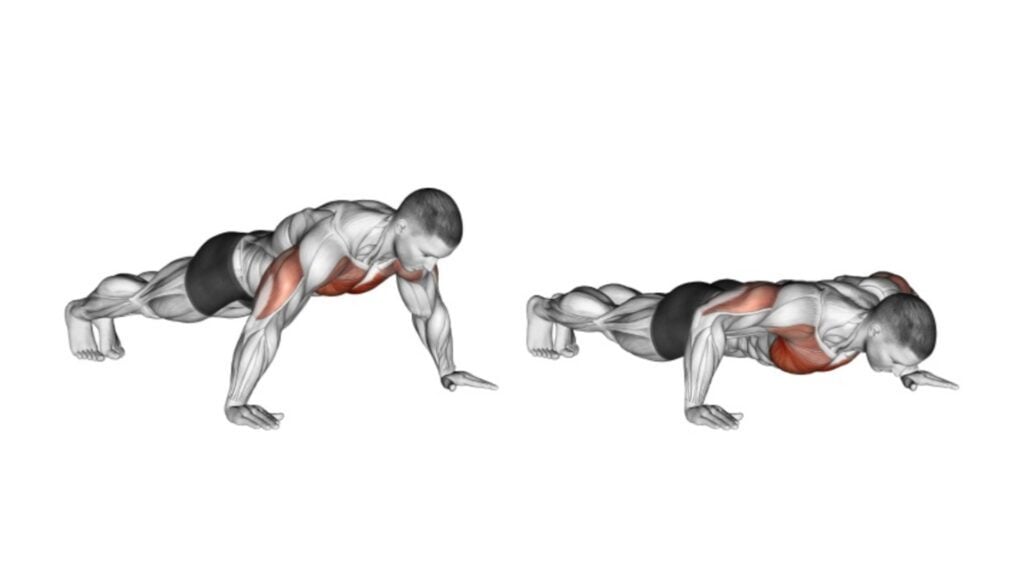
7. Decline Push-Up
The decline pushup is a variation of the basic pushup. It is done with your feet on an elevated surface, which puts your body at a downward angle and works your shoulders and chest.
It puts special emphasis on the muscles in your upper chest.
It is a more difficult version of a regular push-up in which you raise your feet higher than your hands.
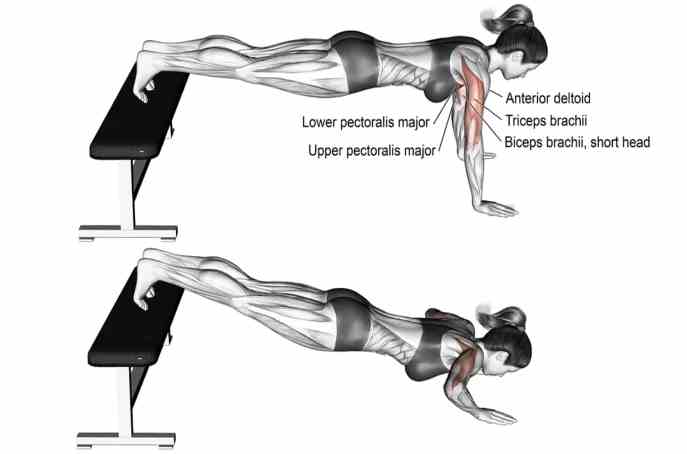
8. Parallel Bar Dip (Chest Dip)
The parallel bar dip is a compound exercise primarily targeting the chest muscles (pectoralis major), triceps, and shoulders.
Parallel bar dips allow for a greater range of motion than many chest exercises. To train the lower chest effectively, you should lean forward rather than upright.
The range of motion of the dip allows for a deeper stretch on the lower chest and triceps.
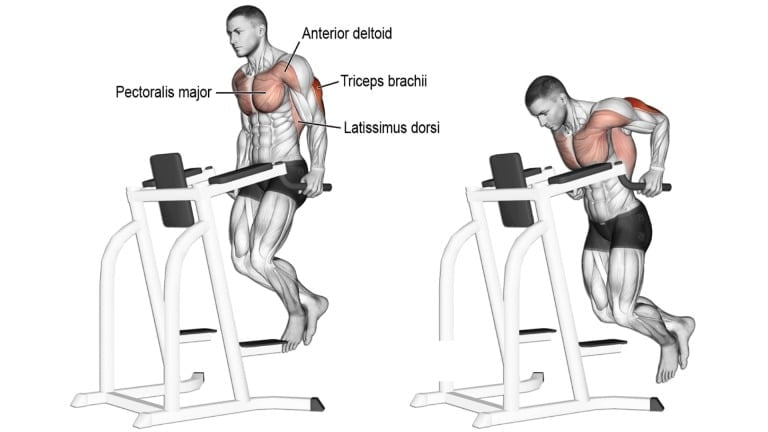
9. Spider-Man Push-Up
A Spider-Man push-up is an advanced variation of the traditional push-up exercise that targets the core, shoulders, and back muscles.
The twisting motion of the Spider-Man push-up also targets the oblique muscles and abs, helping to strengthen and tone the muscles.
This exercise is primarily chest and arm strengthening, but it also increases hip flexibility and works your core.
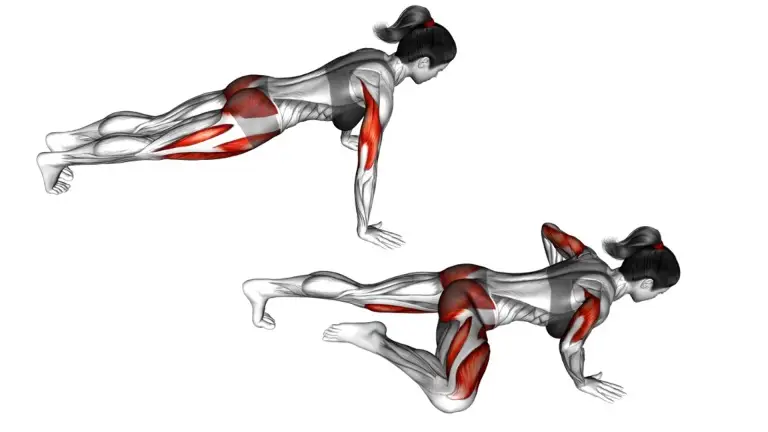
10. Shoulder Tap Push Up
The shoulder tap push-up is a variation of the traditional push-up that strengthens the chest, shoulders, triceps, and core muscles.
It is a full-body strength move that focuses on your arms and chest while also strengthening your core.
- It is performed by starting in a plank position,
- lowering the chest towards the ground, pushing back up to the plank position,
- lifting one hand off the ground and tapping the opposite shoulder.
- Repeat with the other hand.
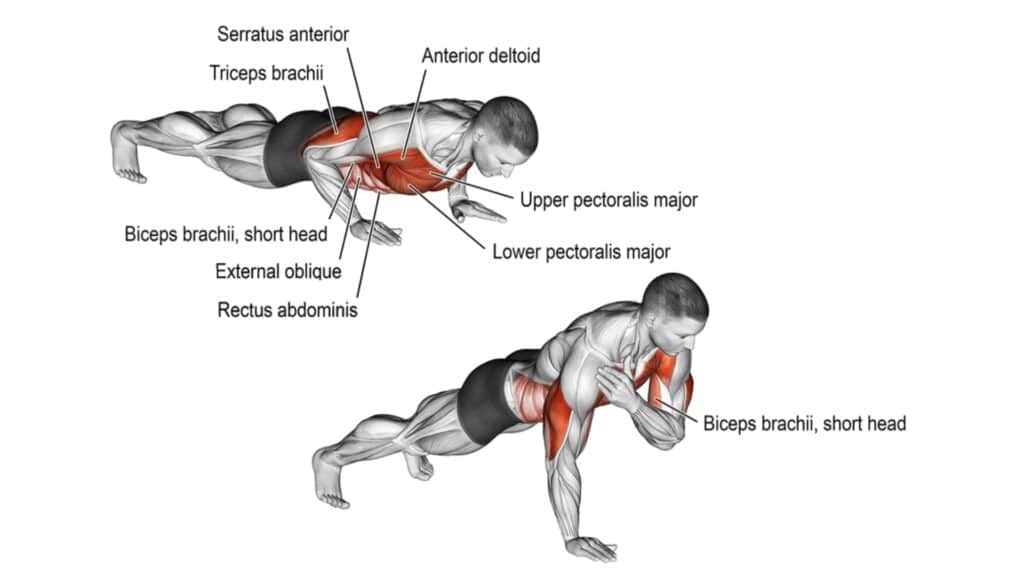
11. Hindu Push-Up
Indian wrestlers call it ‘Dand’. This exercise is different from regular pushups and is thought to give a more complete workout.
Just like the push-up, the Hindu push-up can be performed anywhere and is a great option for a home workout.
Each repetition involves going from a downward dog position to a cobra pose and swooping by holding the head and body close to the ground.
Bruce Lee also incorporated Hindu pushups in his training regime.
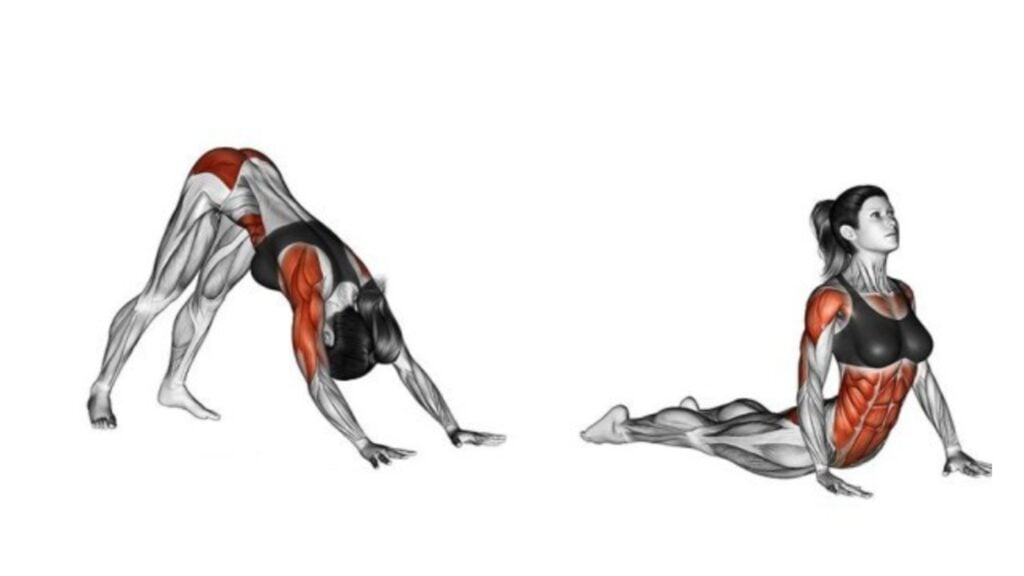
12. Alternate Punching
Alternate Punching is a dynamic exercise that enhances cardiovascular health, boosts upper body strength, and improves coordination.
This exercise engages the chest, shoulders, arms, and core and improves coordination, endurance, and agility.
It’s popular in boxing, martial arts training, and functional fitness routines.
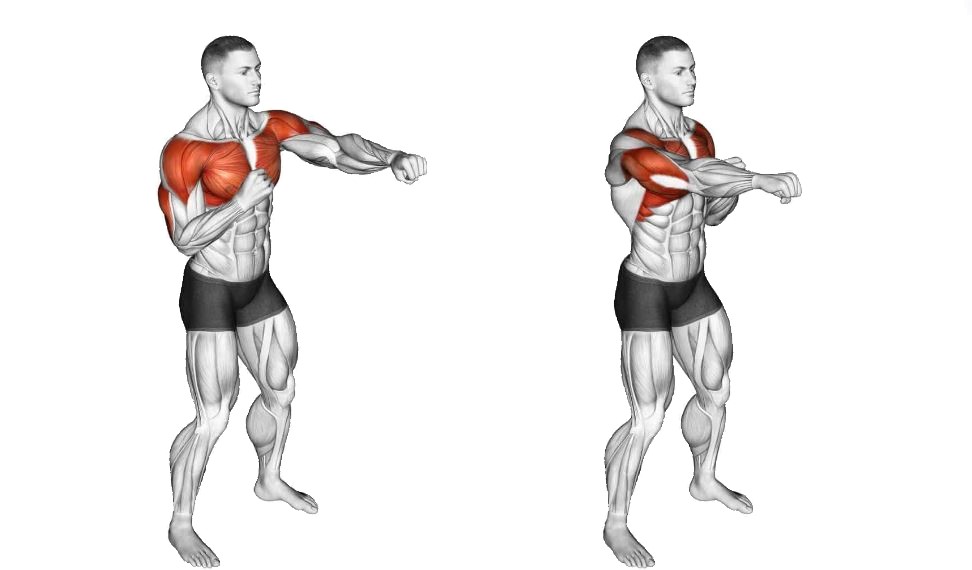
13. Diamond Push Up
Diamond push-ups, also known as triangle push-ups, are a more advanced type of the classic push-up.
You can practice diamond push-ups by bringing your hands too close together to form a diamond or triangle shape below your chest.
Several benefits include increased triceps and chest activity, improved core strength and stability, and enhanced shoulder strength.
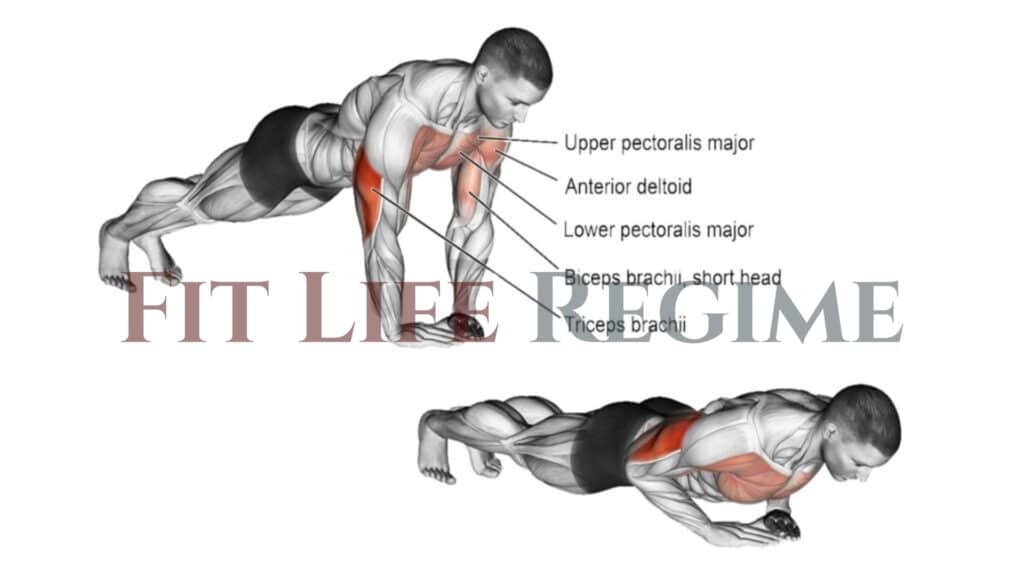
14. Single-Leg Push Up
The single-leg push-up is a challenging variation of the classic push-up that takes it to a whole new level.
It’s not just about upper body strength; it also requires core stability, balance, and coordination.
Once you can do single-leg push-ups on a flat surface, try for a more significant challenge.
- by adding weight, like a weighted vest or backpack.
- Try single-leg push-ups with a medicine ball for an even more significant core challenge.
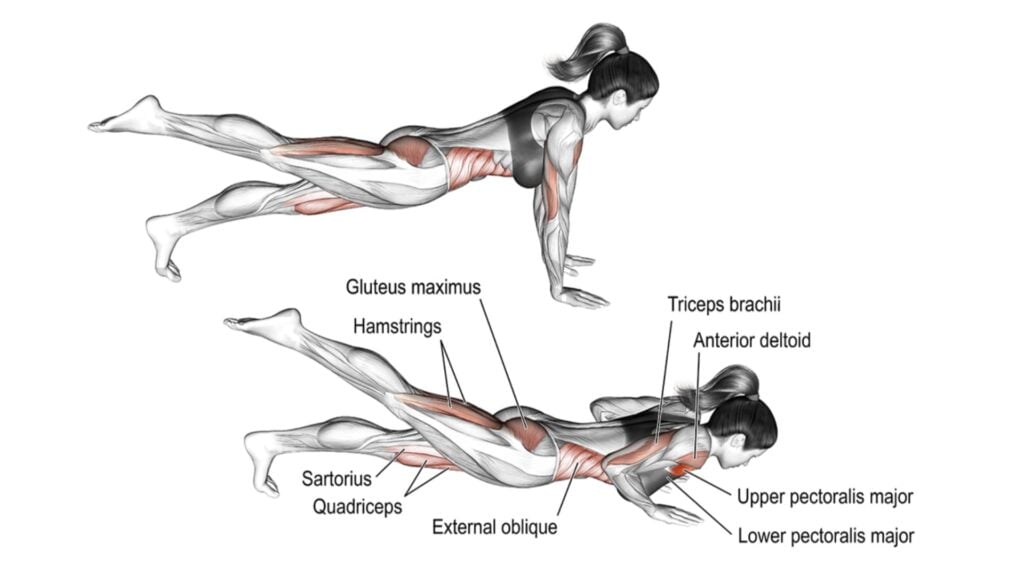
15. Clapping Push-Up
Regular push-ups are common exercises, but their more powerful cousins are very intense and powerful.
Clapping Push-ups are an advanced variation of push-up exercise that works your chest, triceps, abs, and shoulders.
The clap push-up is a difficult exercise that combines strength and technique. It’s good for both athletes and lifters.
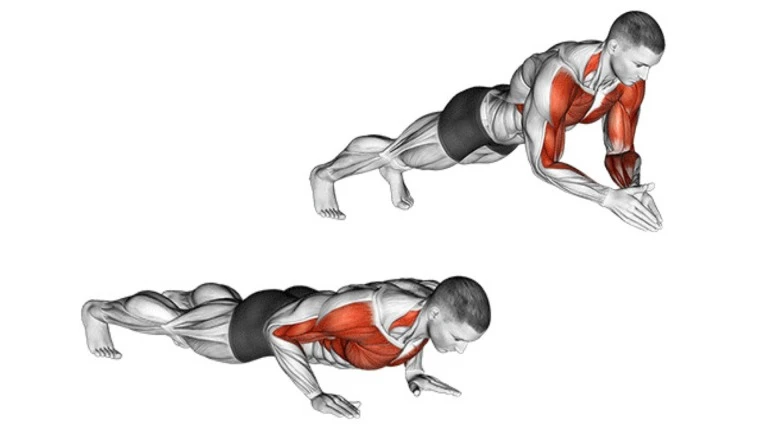
16. T Push Up
A T push-up is a variation of the traditional push-up that adds a rotational movement. This compound exercise primarily targets the chest, shoulders, and triceps.
The exercise is performed similarly to a traditional push-up. However, with an additional movement, one arm is lifted and rotated out to the side, forming a “T” shape with the body.
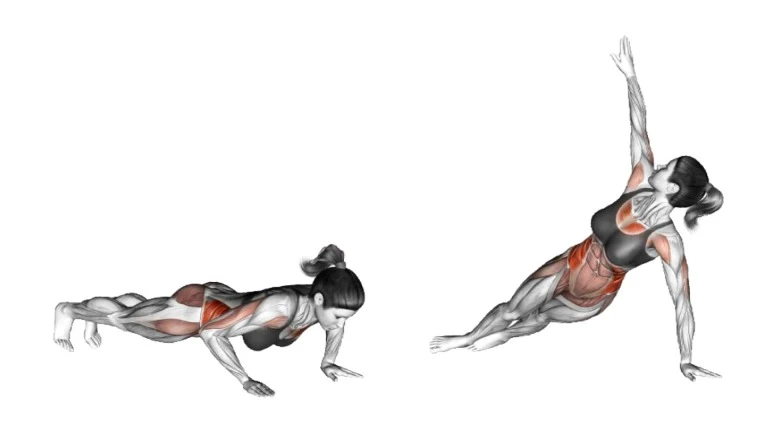
Name Of Bodyweight Back Exercises
Bodyweight training helps build a strong, muscular back through challenging exercises that use your weight as resistance.
When doing calisthenics, it’s important to do it correctly to build the connection between your mind and muscles that helps your muscles grow.
This glossary will overview popular bodyweight back moves, such as pull-ups, Superman holds, back extensions, and inverted rows.
Let’s build a stronger back with no equipment required!
1. Pull-Up
The pull-up is an upper-body strength movement that targets your wings, chest, shoulders, and arms.
They are often a challenge for beginners and even experienced athletes to perform.
The pull-up increases your back’s strength, thickness, and width, specifically your lats. The lats influence the back width and form the “V” in the upper back.
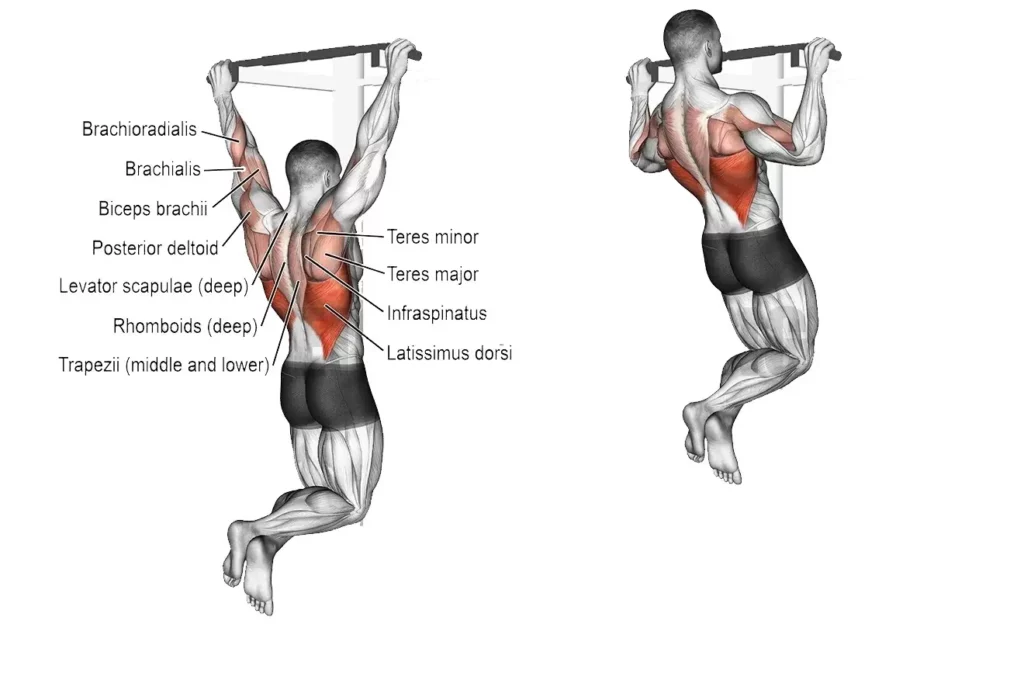
2. Chin Ups
Do you think chin-ups are just a back workout? Think again. Chin-ups are a powerful exercise that works many muscles. It gives you a more vigorous upper-body workout than you’re expecting.
Initially, chin-ups and pull-ups may appear similar, but there are actually some key differences between them.
- Chin-ups are performed with an underhand or supinated grip, with palms facing toward you.
- Many find chin-ups to be slightly easier than pull-ups.
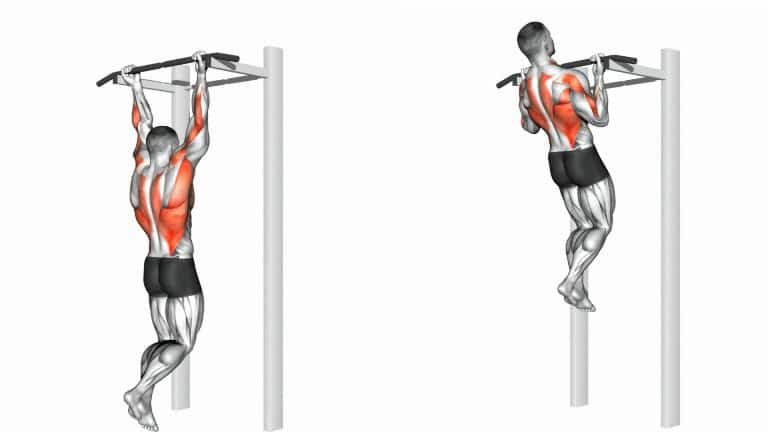
3. Neutral-Grip Pull-Ups
In neutral-grip pull-ups, the hands are positioned with a parallel grip (palms facing each other) on the bar or a parallel bar.
This grip variation puts less stress on the shoulder, and also works on the biceps and forearms.
A neutral grip pull/chin-up variation can be useful for those with shoulder injuries or pain, as it is less stressful on the shoulder joint.
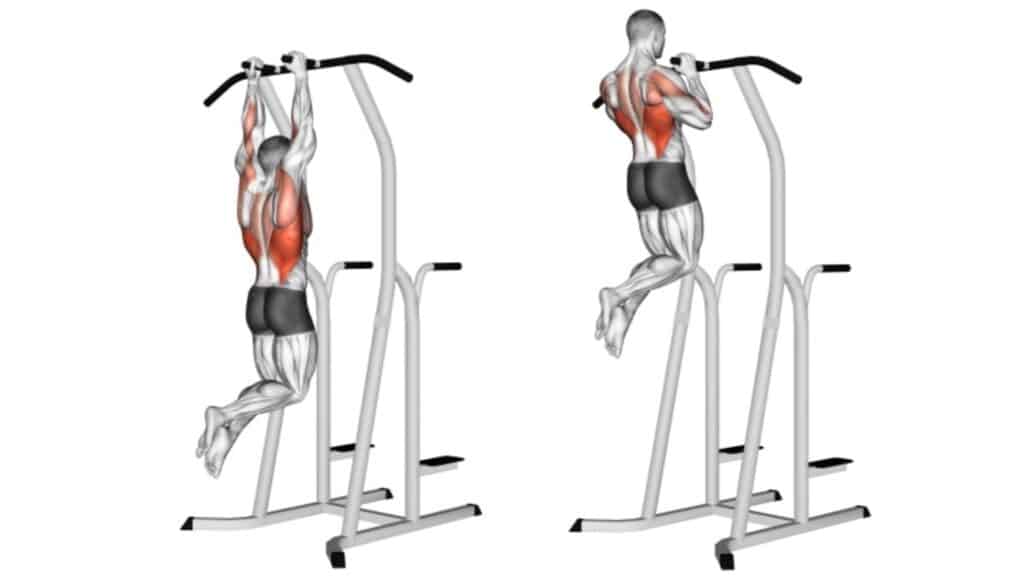
4. Inverted Row
The inverted row is a bodyweight exercise where you push yourself up towards a bar or other sturdy overhead support.
Due to the reduced bodyweight resistance, the inverted row is easier to perform than pull-ups. It’s a great starting point for building upper body strength for those who find pull-ups too challenging.
It effectively targets various muscle groups, including your back muscles (lats, traps, rhomboids), biceps, shoulders, core, and hamstrings and glutes.
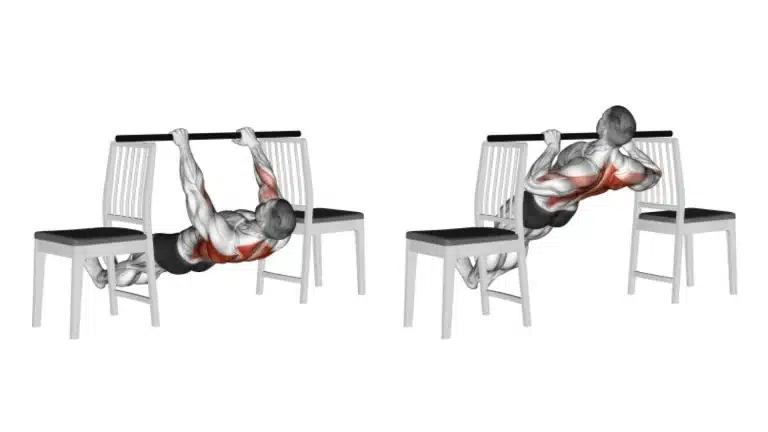
5. Superman
Superman is one of the best back exercises you can do without equipment. It strengthens your upper and lower back muscles.
If done regularly, the Superman exercise may help alleviate back pain related to weak back muscles.
Additionally, it strengthens back muscles. It also works on your glutes and your hamstring muscles.
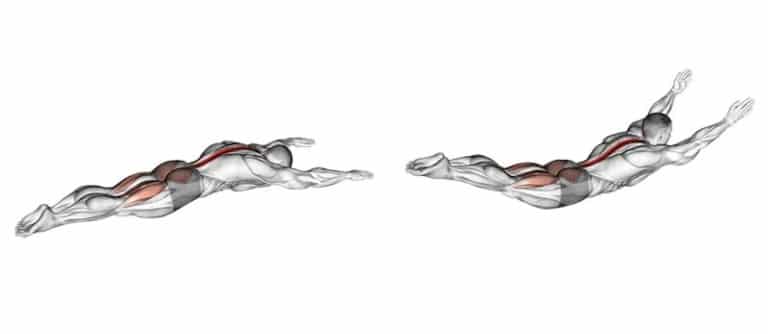
6. Good Morning
The good morning exercise is a hinge movement where you bend at the hips while keeping your back straight.
It effectively targets your glutes, hamstrings, and lower back.
- The erector spinae muscles of the lower back work isometrically to keep the spine in an extended position
- The hamstrings and gluteus maximus work isotonically to perform hip extension.
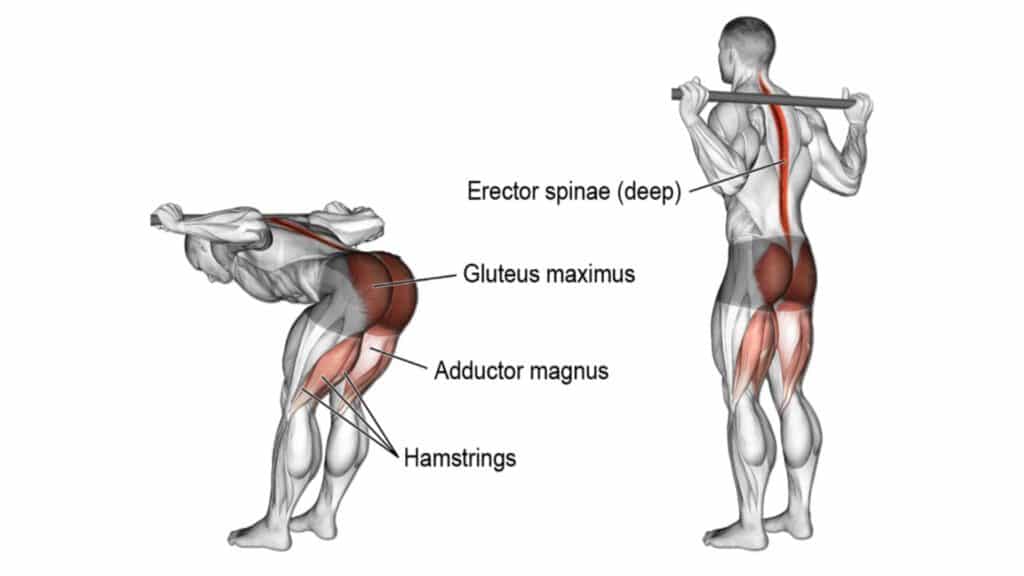
7. Hip Bridge
The hip bridge is a good starter move for butt, hamstring, and lower back muscles and the best back exercises at home to manage chronic low back pain.
But when you do glute bridges regularly, you work your glutes and lower back muscles.
These muscles are meant to hold your body upright, so they will get stronger when you do this.
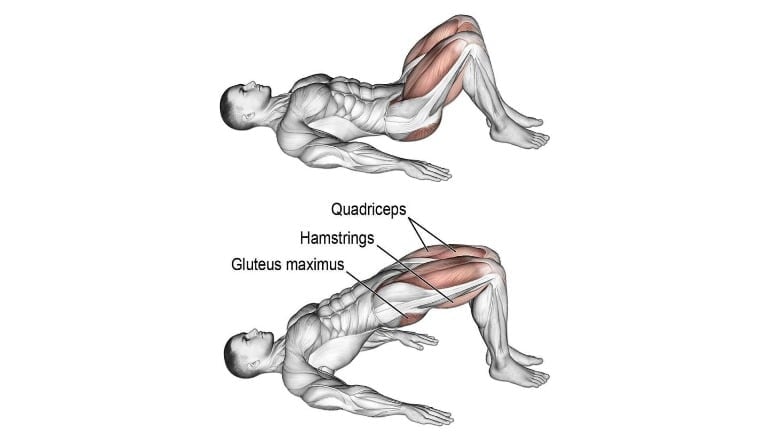
8. Flat Bench Hyperextension
The flat bench hyperextension is a strength training exercise that primarily targets the lower back muscles, but also engages the glutes and hamstrings.
Stronger lower back muscles can help reduce the risk of injury, especially during other physical activities and sports.
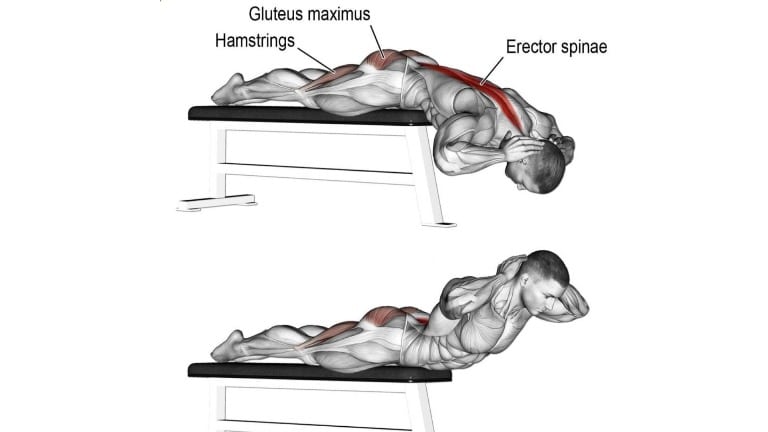
9. Bird Dog
The Bird Dog exercise is a fantastic way to strengthen your core, improve your balance, and increase your stability. It targets your core, lower back, shoulders, and hips.
It is a low-impact exercise, making it a good option for people with joint pain or injuries.
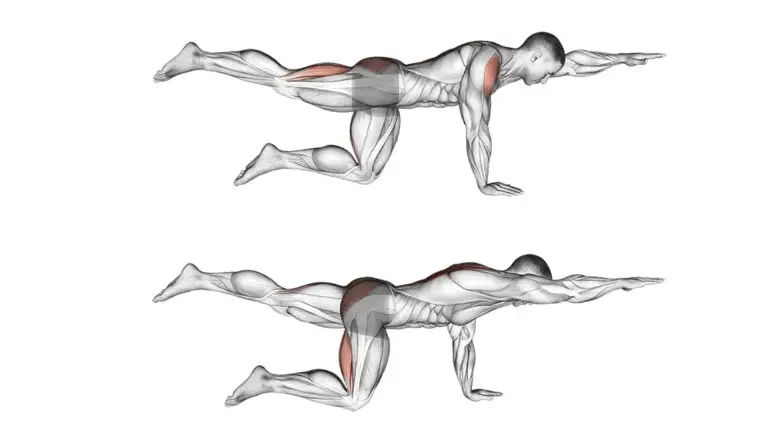
10. Cat Cow
The cat-cow exercise is a spinal mobilization exercise that helps a person “loosen” their spine and improves movement of the lower back.
It is a gentle flow between two poses, which warms the body and improves spine flexibility.
This exercise stretches the back and neck, softly stimulates and strengthens the abdominal organs, and opens up the chest.
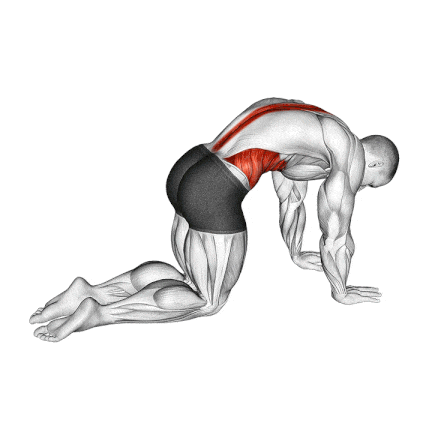
11. High Reverse Plank
The reverse plank exercise is a great bodyweight shoulder exercise for strengthening your core and the key muscles of your posterior chain, namely, your erector spinae, gluteus maximus, and hamstrings.
Beginners should start with learning the regular plank.
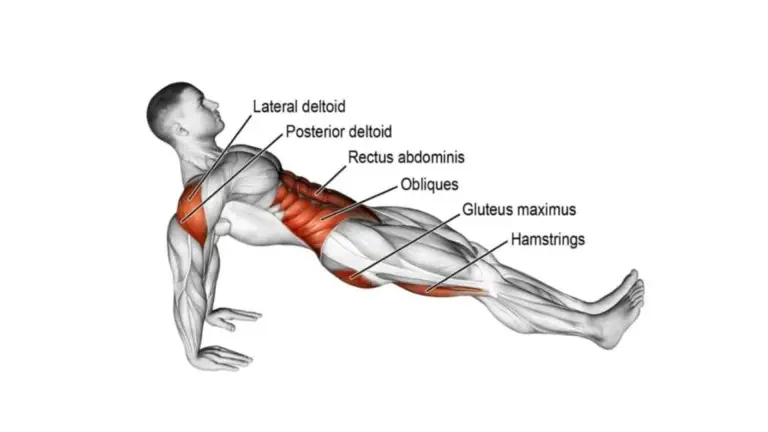
12. Bodyweight Shrugs
Bodyweight shrugs are a great way to work your traps without any equipment. It involves lifting and lowering the shoulders in a controlled manner.
Bodyweight shrug is one of the most common trap exercises that target the upper traps.
For an added challenge, try holding a heavy book or water bottle in each hand while you perform the exercise.
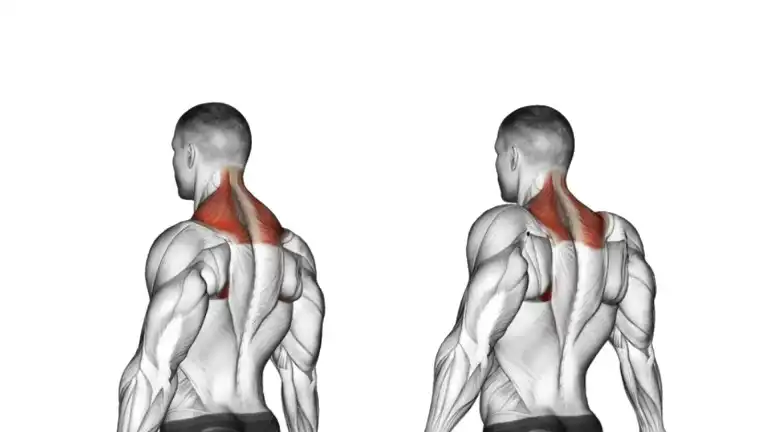
13. Commando Pull-Ups
In this variation, the hands are positioned with a narrow grip, mimicking the grip of a hockey stick, with the palms facing away from the body.
It emphasizes the biceps and forearms more than the back. It can also be a great way to improve grip strength and endurance.
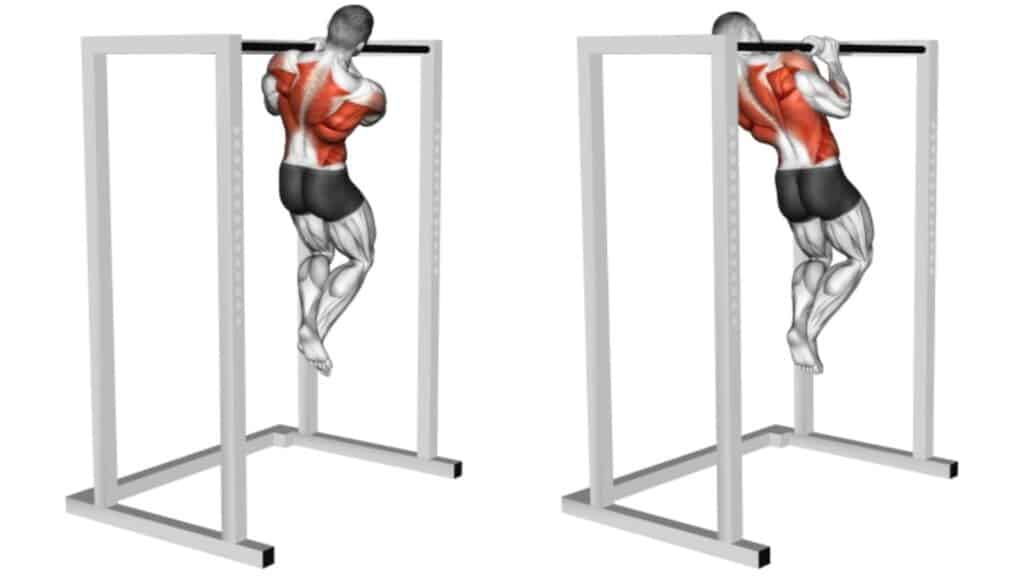
14. Behind-The-Neck Pull-Ups
Behind-the-neck or rear pull-ups are variations of your pull-up routine that can be added to prevent boredom and increase intensity.
It requires a greater range of motion than a standard pull, which is why it is often more challenging.
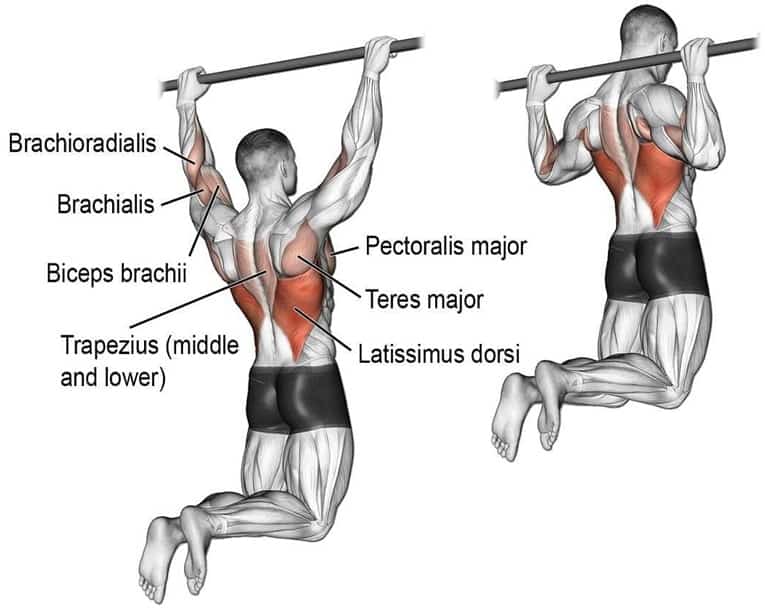
15. Muscle-Up
The muscle-up is an advanced bodyweight exercise that combines a pull-up and a dip into one movement.
It requires significant upper-body strength and skill to perform
It’s recommended that beginners start with simpler exercises like pull-ups and dips and gradually work their way up to the muscle-up.
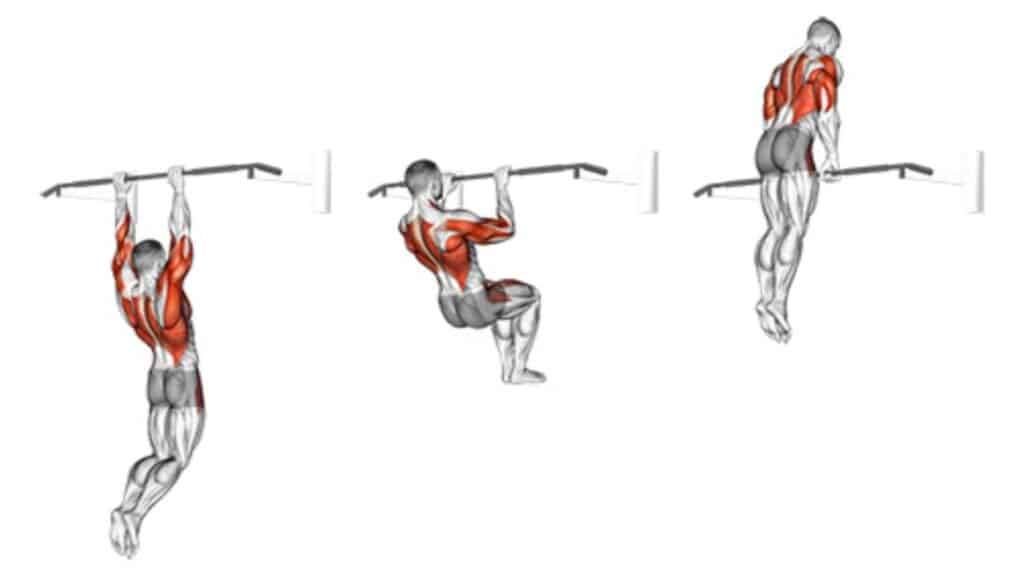
16. Cobra Pose
Cobra Pose (Bhujangasana) is a yoga pose that strengthens the back and core muscles while stretching the chest and lungs.
It works the spinal erectors, glutes, rear delts, traps, and latissimus dorsi muscles for better posture and stability.
The stretch also promotes flexibility and blood flow in the torso, which aids muscle recovery.
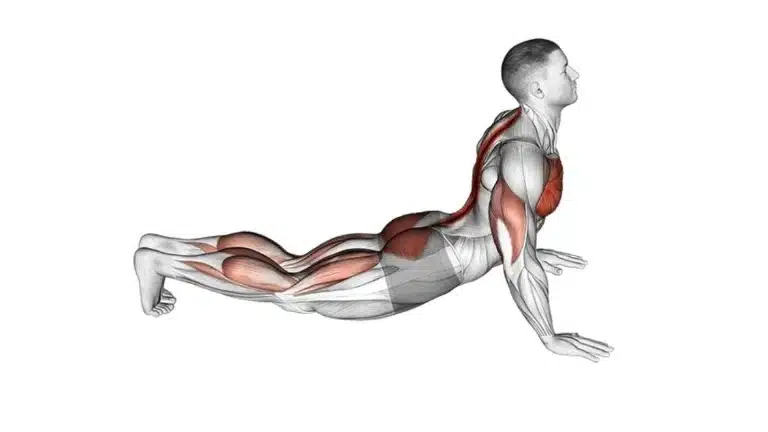
Name Of Bodyweight Shoulder Exercises
Bodyweight training helps build strong, muscular shoulders through challenging exercises that use your weight as resistance. With callisthenics, good form is important for building the mind-muscle connection that is important for muscle growth.
This glossary will overview popular bodyweight shoulder moves like handstand push-ups, pike push-ups, shoulder taps, and arm circles.
Let’s build stronger shoulders with no equipment required!
1. Pike Push Up
The Pike Push-Up is an advanced bodyweight exercise primarily targeting the shoulders, particularly the deltoids. It also engages the upper chest, triceps, and core muscles.
This exercise is a progression from the standard push-up and is often used to build strength for more advanced movements like handstands or handstand push-ups.
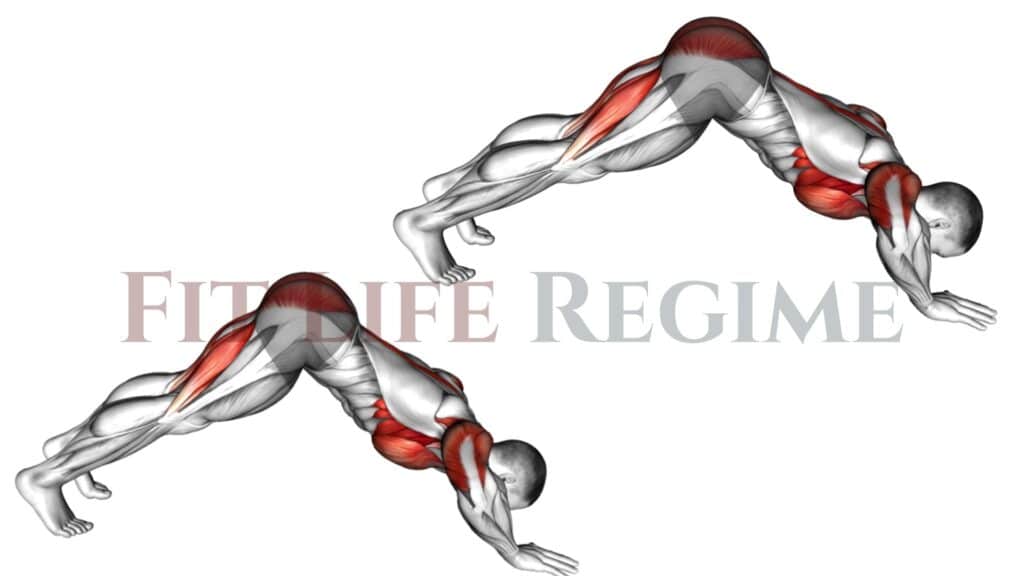
2. Plank To Push-Up
The plank to push-up is great for building upper body strength and endurance. It also works the core and improves stability.
It combines the traditional plank exercise with the push-up exercise to create a more challenging shoulder workout.
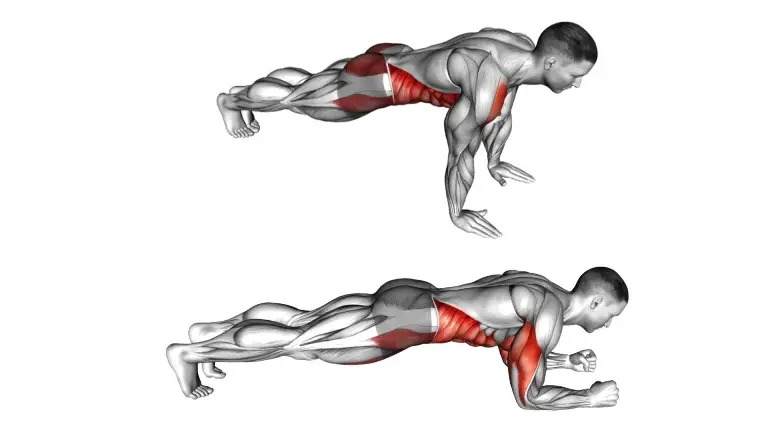
3. Tabletop Reverse Pike
Tabletop Reverse Pike is a fantastic bodyweight exercise that targets your core, glutes, hamstrings, and shoulders. It’s challenging and can significantly improve your strength and stability.
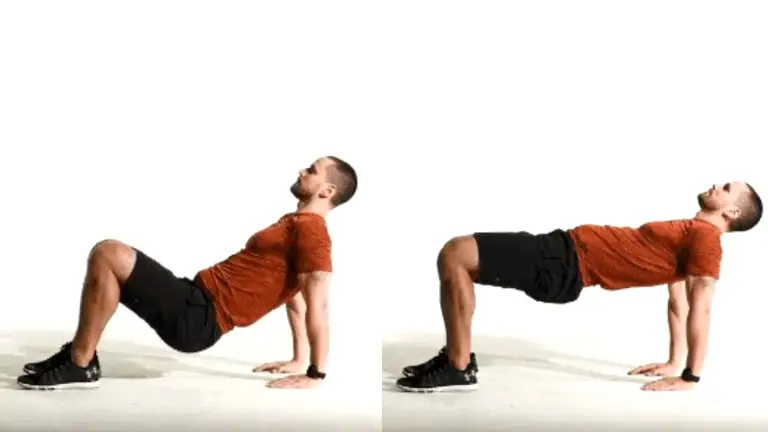
4. Crab Walk
The Crab walk is an excellent bodyweight exercise that mainly works the upper arms, shoulders, legs, and core.
It is excellent for toning, effectively targeting all your muscle groups, and working them hard to build strength.
Moves like the crab walk are great total-body exercises that don’t require additional equipment.
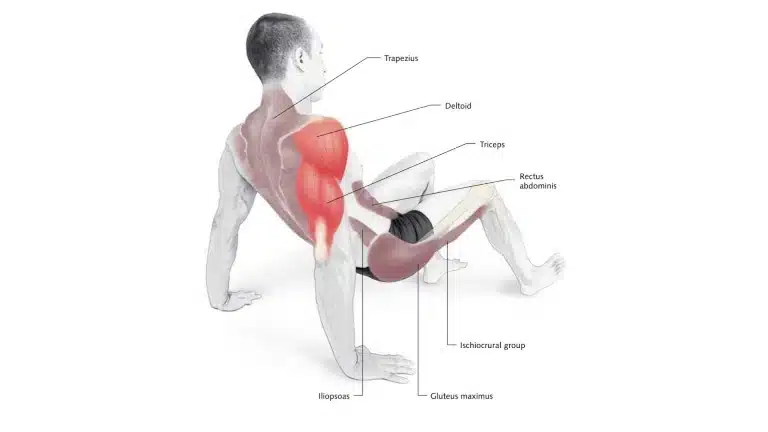
5. Archer Push-Up
In an Archer push-up, the arms are kept wider than in a normal push-up position. As you lower your body, you transfer most of your weight to one of your hands and incline towards that hand while the other is kept straight.
Simultaneously, move your body to both sides. You must maintain a tight, steady, and controlled body for an Archer push-up.
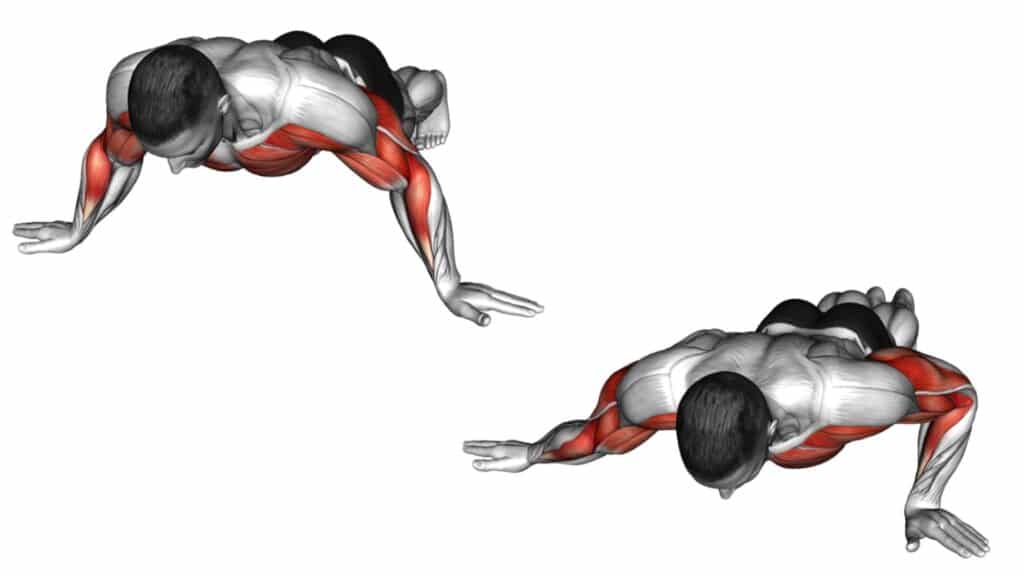
6. Stability Ball Push Up
As the name suggests, a stability ball push-up is performed with your hands placed on a stability ball instead of the ground.
Using an exercise ball gives you an uneven surface to increase the difficulty of the exercise, which helps to involve the shoulder and triceps more.
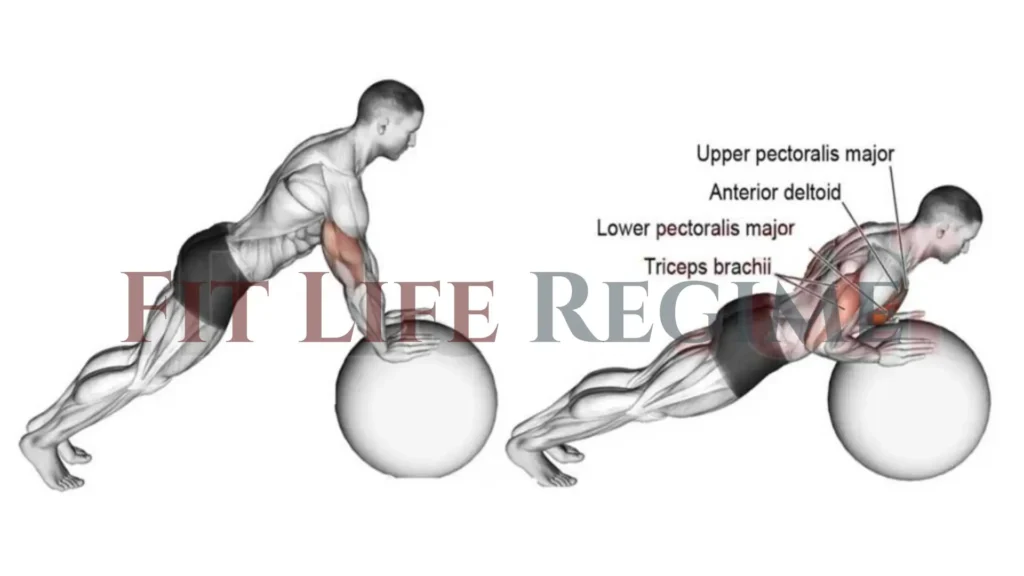
7. High Reverse Plank
The reverse plank exercise is a great bodyweight exercise for strengthening your core and the key muscles of your posterior chain, namely, erector spinae, gluteus maximus, and hamstrings.
It is also great for opening the shoulders and building shoulder strength.

8. Elevated Pike Push-Up
The elevated pike push-up is a great exercise for building upper body strength, especially in the shoulders and triceps.
The elevated position also increases the demand on the core muscles, making it a great exercise for targeting the core.
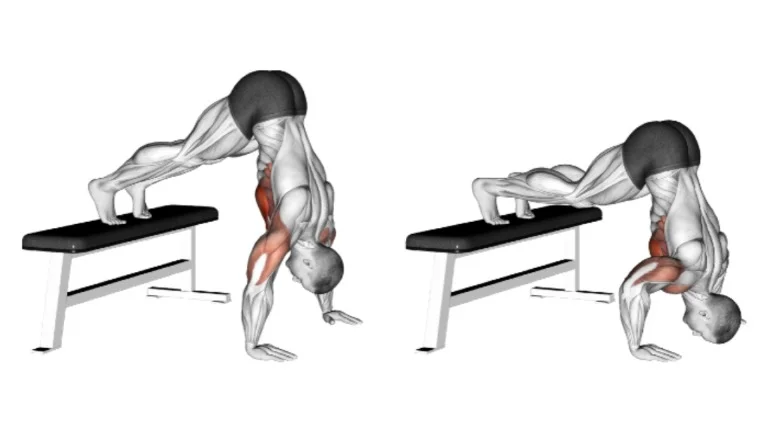
9. Bear Crawl
The Bear Crawl is a dynamic bodyweight exercise that engages multiple muscles, including the shoulders, arms, core, and legs.
It’s a functional movement that mimics the action of crawling on all fours.
This exercise builds strength and endurance in the shoulders by placing continuous tension on them.

10. Arm Circles
Arm Circles are a simple yet effective bodyweight exercise that primarily targets the muscles in the shoulders.
This exercise is often used to warm up the shoulder joints and muscles before engaging in more intense physical activity.
It improves the range of motion and mobility in the shoulder joints.
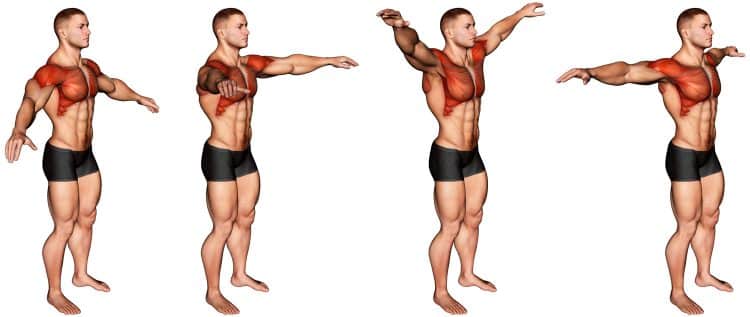
11. Wall Walk
The Wall Walk, also called the Wall Climb, is a bodyweight workout that works all your body parts. It helps you get stronger, more stable, and more coordinated in your upper and lower body.
To do this exercise, you start in a plank position facing away from a wall. Then, you walk your feet up the wall while moving your hands toward it.
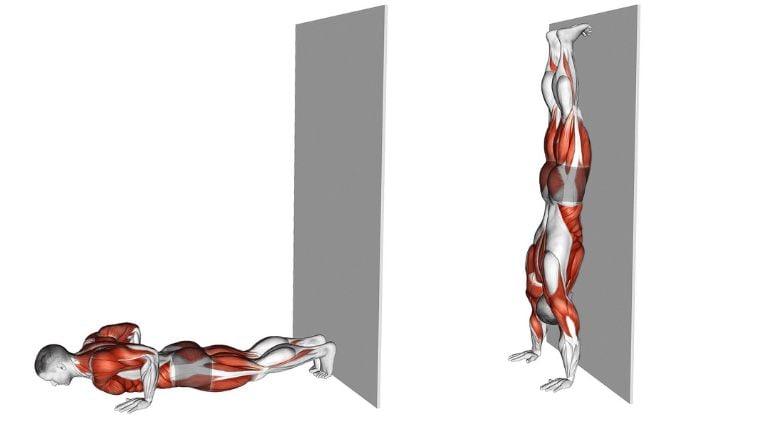
12. Scapular Wall Slides
Scapular wall slides—also known as wall slides or reverse wall slides—are one of the basic exercises that people are taught to practice for improved shoulder rotation, upper back activation, and scapular mobility.
The study found that the group that did wall slide exercises had a significant decrease in pain in the rotator cuff muscles after four weeks.
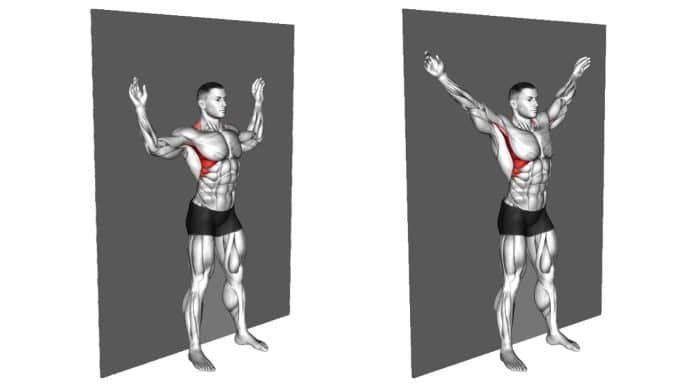
13. Alternating Superman Plank And Reach
The Superman Plank is an isometric training exercise. Before training with this plank variation, you should know how to do the more basic planks.
It increases the core-strengthening benefits of a regular plank by balancing on only two limbs.
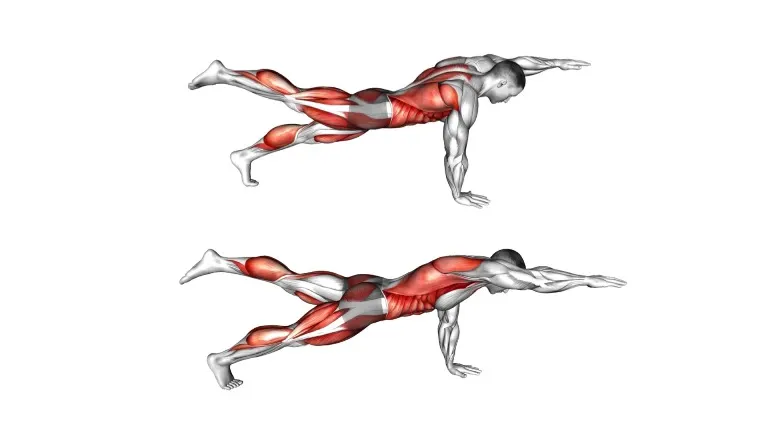
14. Lateral Plank Walk
The Lateral Plank Walk is a full-body exercise mainly targeting your core and shoulders.
Take a walk on the wild side as well, as wild as a plank can get.
This move intensely engages your core like a classic plank, but the side-to-side motion also works your arms and delts. Plus, it’ll challenge your balance and stability.
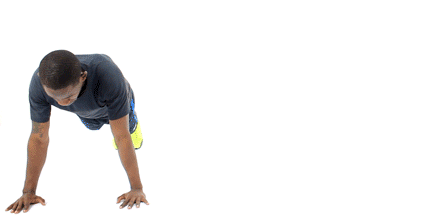
15. Scapula Push Ups
Scapula Push-Ups, or Scap Push–Ups, are among the best exercises for strengthening the upper back muscles and improving shoulder strength and mobility.
It is considered to be more challenging than a conventional push-up because you need to hold a good position on your plank while pushing yourself up.
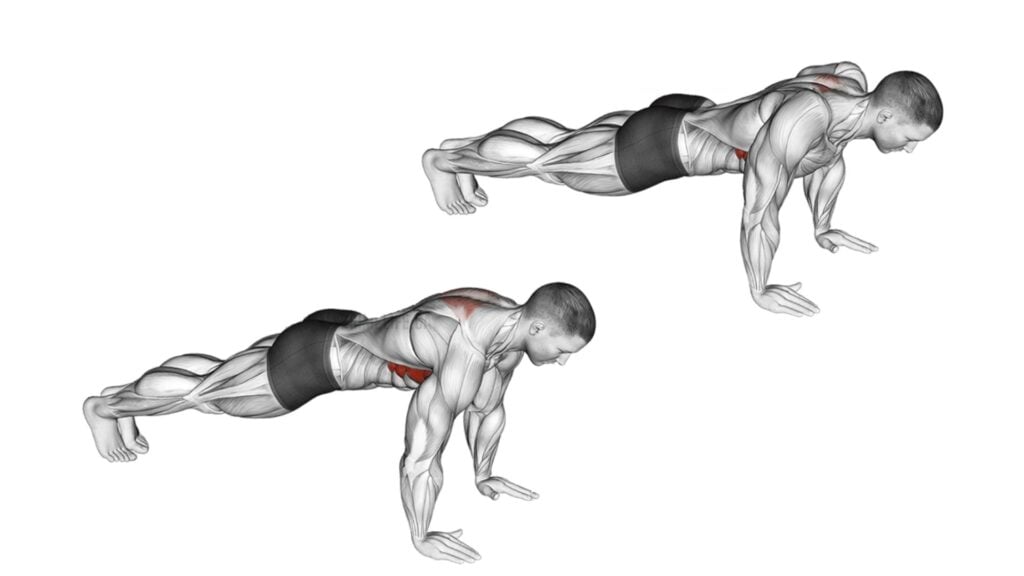
16. Handstand Push Up
The Handstand Push-Up is an advanced calisthenics exercise that primarily targets the shoulders, triceps, and upper chest. It also significantly engages the core muscles for stability.
This exercise progresses from simpler exercises like the pike push-up.
The act of maintaining a handstand while performing push-ups enhances balance and coordination skills.
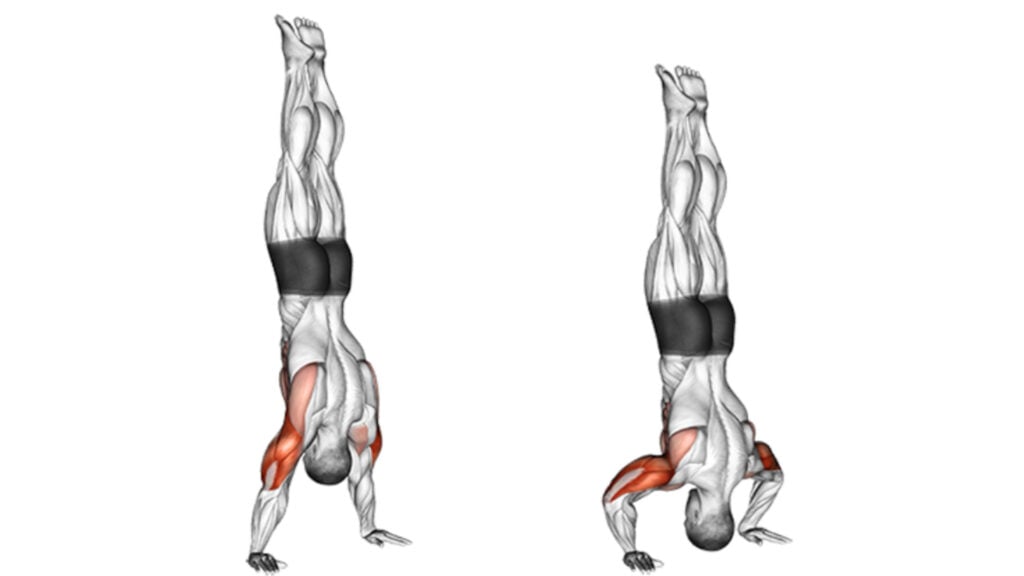
Name Of Bodyweight Bicep Exercises
Many people looking to get in shape want to build defined, toned arms. Biceps are an iconic muscle group that is satisfying to train and sculpt.
Luckily, many effective bodyweight bicep exercises require no equipment and can be done anywhere.
The following bodyweight moves will challenge your biceps, build muscle, and help you achieve stronger, more toned arms.
1. Chin Up
One of the best bodyweight exercises for your biceps is the chin-up. This bodyweight exercise can induce serious muscle growth in the back and biceps.
In this exercise, the palms are faced towards the body. Since the lifter is pulling its body weight, the biceps are usually exposed to loads heavier than one can lift with a barbell.
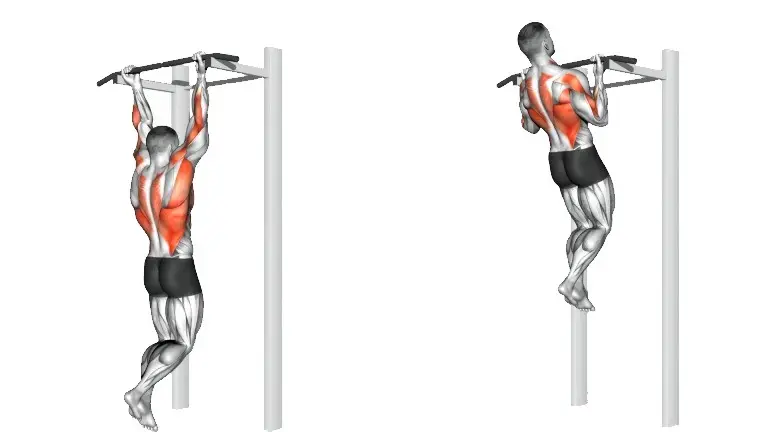
2. Reverse Grip Push-Ups
The reverse grip push-up is a fun and great variation of the standard push-up. You do it with your fingers facing your feet (your palms outward).
Many consider it the “bicep push-up” because of the hand position; it emphasizes your biceps a little more than the standard push-up.
You can do the Reverse Grip Push-Ups on the knee or the inclined surface for easier variation.
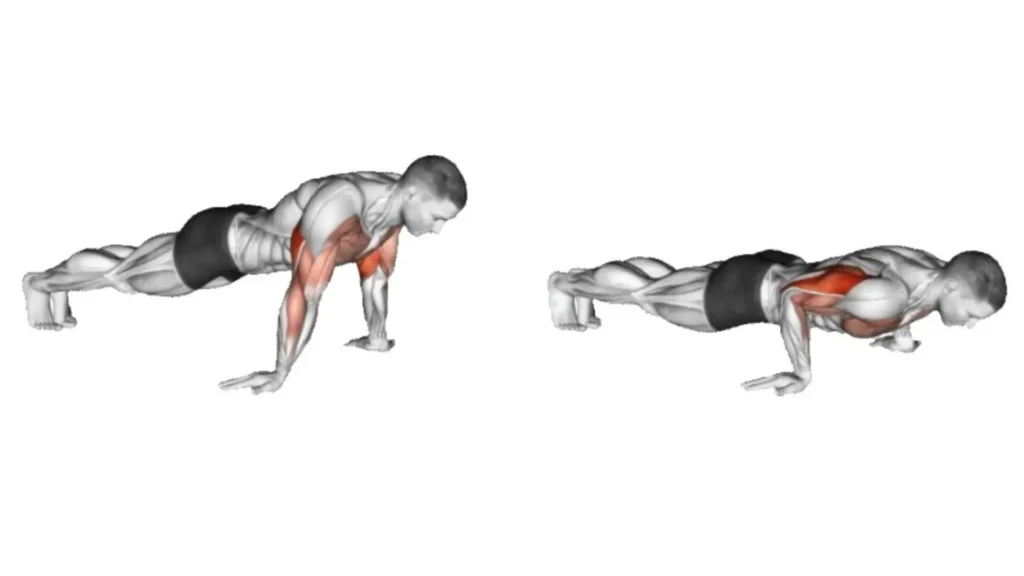
3. V-Grip Pull Up
The V-grip pull-up is a strength training exercise. This bodyweight exercise can induce serious muscle growth of the biceps and back. Use a close grip to target your long-head biceps even more.
While this isn’t a bicep-specific exercise like the previous ones, some of the best exercises for your biceps are compound movements.
We chose the neutral grip pull-up because when it comes to the biceps, it targets your long head best.
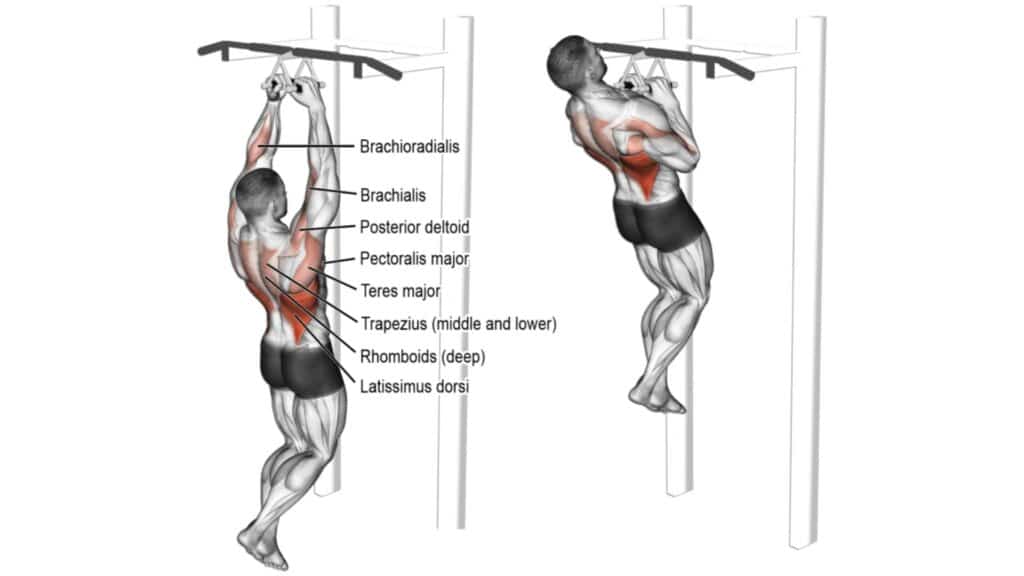
4. Bodyweight Bicep Curl
The bodyweight bicep curl is a simple yet challenging curl variation that relies solely on your own strength rather than external weight.
It is a very effective bodyweight isolation exercise for building Bicep size and strength.
Do a few sets while watching TV, between tasks, or combine them with other bodyweight moves for a complete upper-body workout.
The simplicity and convenience of this exercise make it a must-try bicep builder.
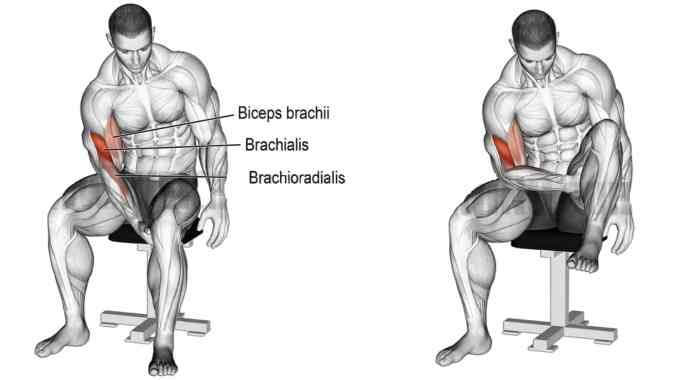
5. Rope Climber
Rope climbs require using your arms and upper body strength to climb a vertical rope. You also need your legs to support and balance you.
It is a full-body exercise that primarily targets the muscles in the upper body, including the forearms, back, and shoulders.
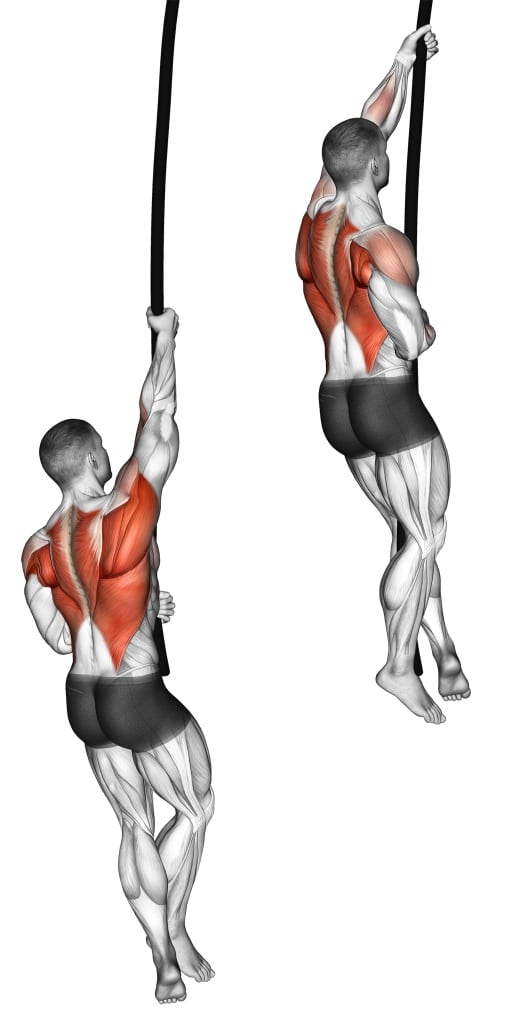
6. Renegade Row
The renegade row is an advanced exercise that combines a plank with a single-arm row. It strengthens your core, back, shoulders, and biceps.
It is a compound movement involving multiple muscle groups, so it can burn many calories and help lose weight.
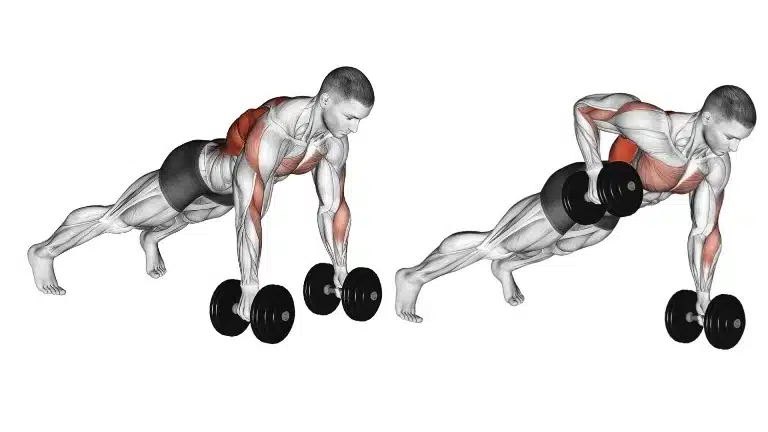
7. Towel Bicep Curl
The Towel Bicep Curl is a resistance exercise using a towel and body weight to target the muscles of the biceps.
This exercise is an innovative way to work the biceps when you don’t have access to traditional weights like dumbbells or barbells.
It’s beneficial for home workouts or situations where you have limited equipment.
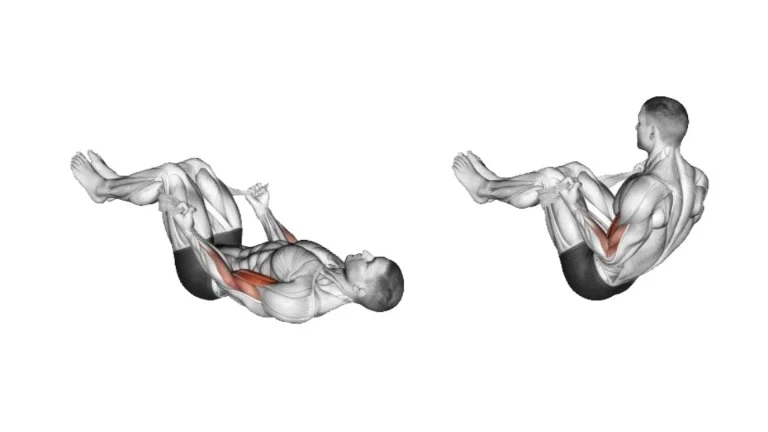
8. Reverse grip Inverted Row
The Reverse Grip Inverted Row is a bodyweight exercise that targets the upper back, biceps, and core muscles.
This variation of the standard inverted row uses an underhand (supinated) grip, which places more emphasis on the biceps.
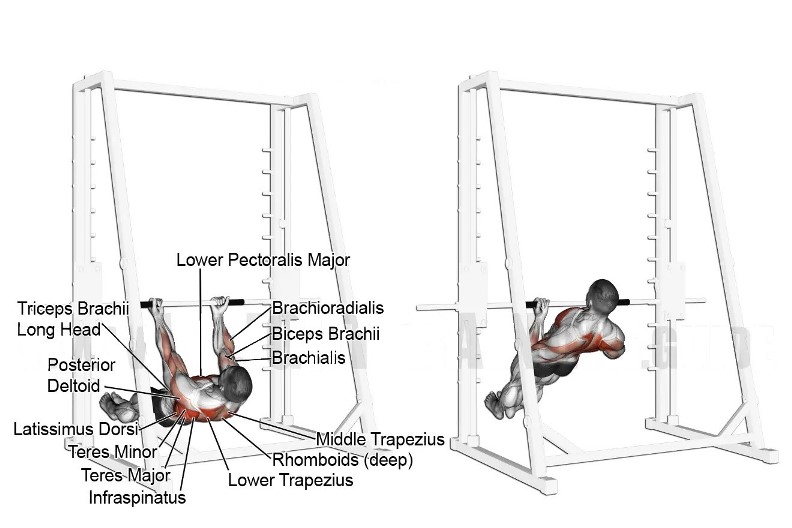
Bodyweight Tricep Exercises With Image
While weight training builds immense tricep strength, you should not underestimate calisthenics training. Bodyweight exercises can help you build power and stability.
Pushups may be king, but dozens of challenging bodyweight moves target the chest from all angles.
Here is a list of 15 best tricep exercises, with images showing the exact body position for each move.
1. Bench Dip
A bench dip is a medium-intensity exercise that uses your own bodyweight to strengthen your triceps.
It primarily targets your triceps, but it also engages your chest, shoulders, and core for stabilisation.
It’s easy to do and can be done almost anywhere, making them a great workout at home.
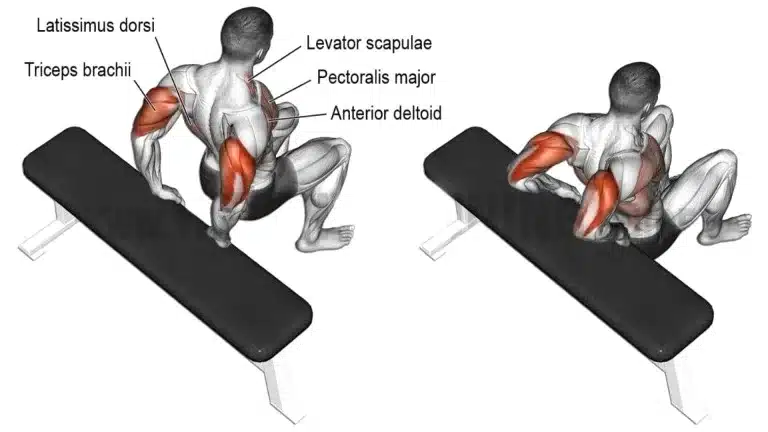
2. Diamond Push-Up On Knees
The diamond push-up on knees is an excellent bodyweight triceps exercise for developing the triceps that can be done at home.
To practice knee diamond push-ups, bring your hands close together to form a diamond or triangle shape below your chest.
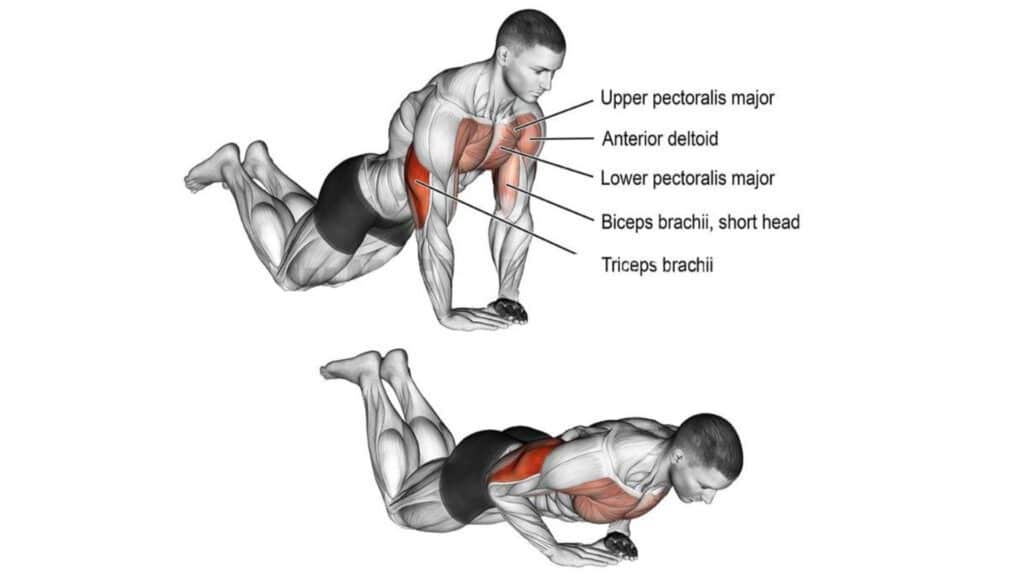
3. Kneeling Bodyweight Triceps Extension
It’s an effective way to build triceps strength using your body weight and can be a good alternative or complement to weights-based exercises.
You can make the exercise more challenging by changing hand positions or adding a slow tempo to increase the time under tension.
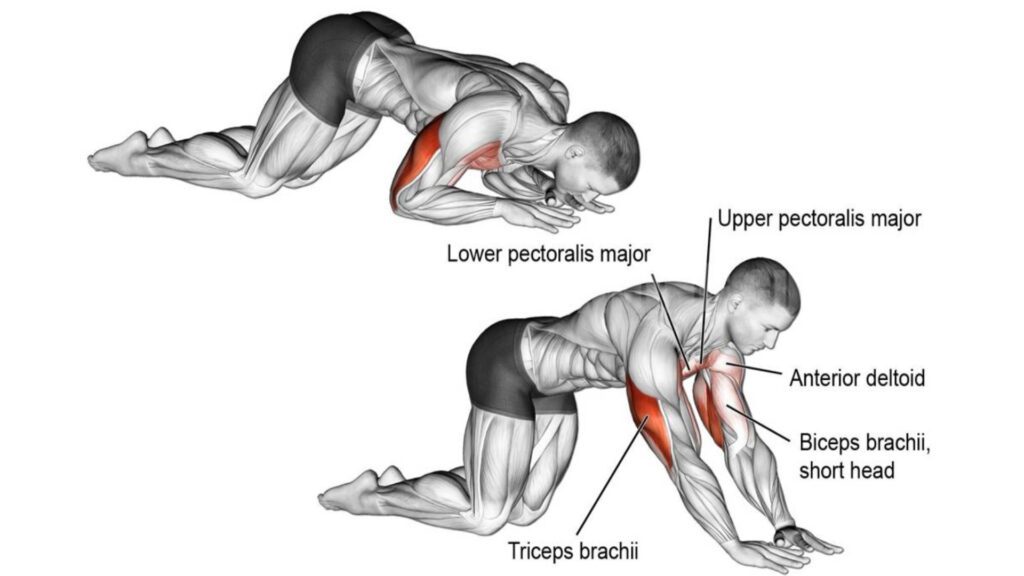
4. Close Grip Push-Ups
The close-grip push-up is a push-up variation where you place your hands closer together than shoulder-width apart, typically with thumbs touching or just a few inches apart.
This narrow hand position shifts the focus of the exercise from your chest to your triceps.
Other Variations:
- Incline close-grip push-ups: To reduce the difficulty, perform the exercise with your hands on an elevated surface.
- Decline close-grip push-ups: Place your feet on an elevated surface to increase the difficulty.
- Weighted close-grip push-ups: wear a weighted vest for an added challenge.

5. Bench Dip With Elevated Legs
This exercise is a more advanced variation of the traditional bench dip and provides an added challenge by elevating the feet, increasing the load on the triceps and chest muscles.
Maintaining proper form throughout the movement is important to avoid strain or injury.
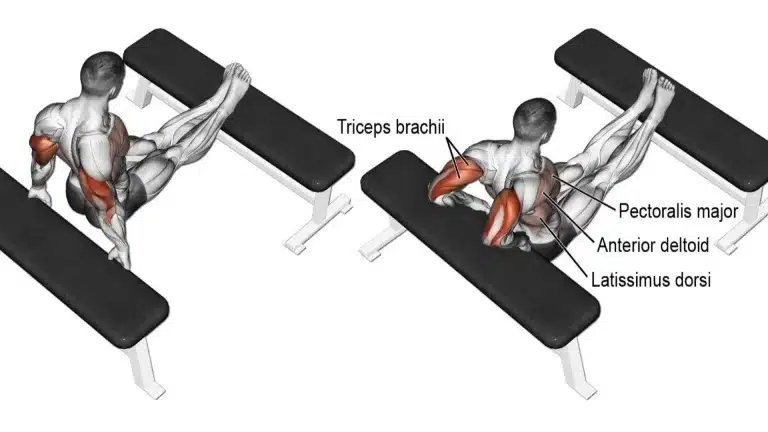
6. Parallel Bar Triceps Dip
Parallel bar triceps dips are one of the most effective compound movements for the upper body. They effectively train the chest, triceps, and anterior deltoid muscles.
It is one of the best bodyweight exercises for building triceps mass when performed on narrow parallel bars with elbows back and your torso upright.
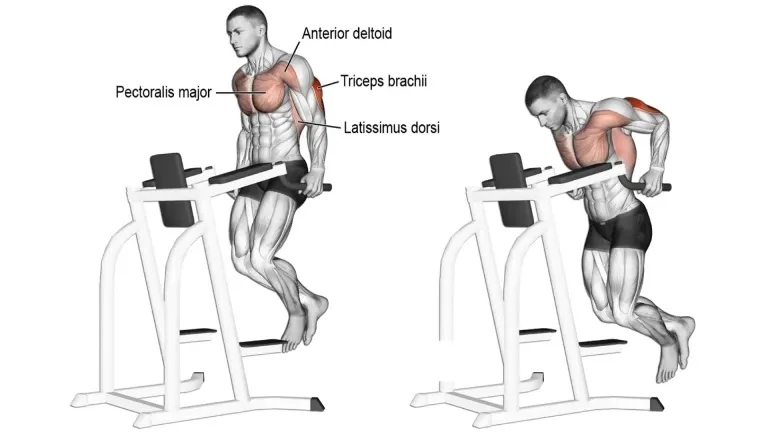
7. One Arm Bench Dip
The one-arm bench dip is a challenging and very effective movement that primarily targets your triceps, but your glutes and quads also get worked secondarily.
This exercise is not recommended for beginners or people with inadequate upper body strength. For an easier variation, you could also try a bench dip.
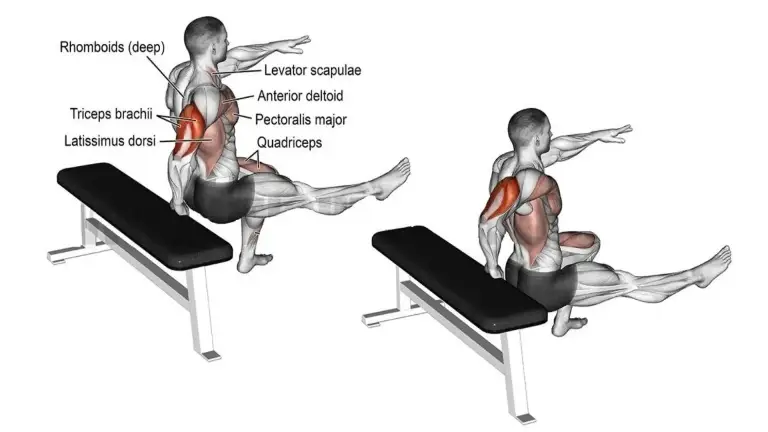
8. Close-Grip Medicine Ball Push-Up
As the name suggests, the close-grip medicine ball push-up is performed with your hands placed closer together than shoulder-width apart (usually thumbs touching or a few inches apart) on top of a medicine ball.
This unstable surface increases core engagement and adds an extra layer of difficulty compared to regular close-grip push-ups.
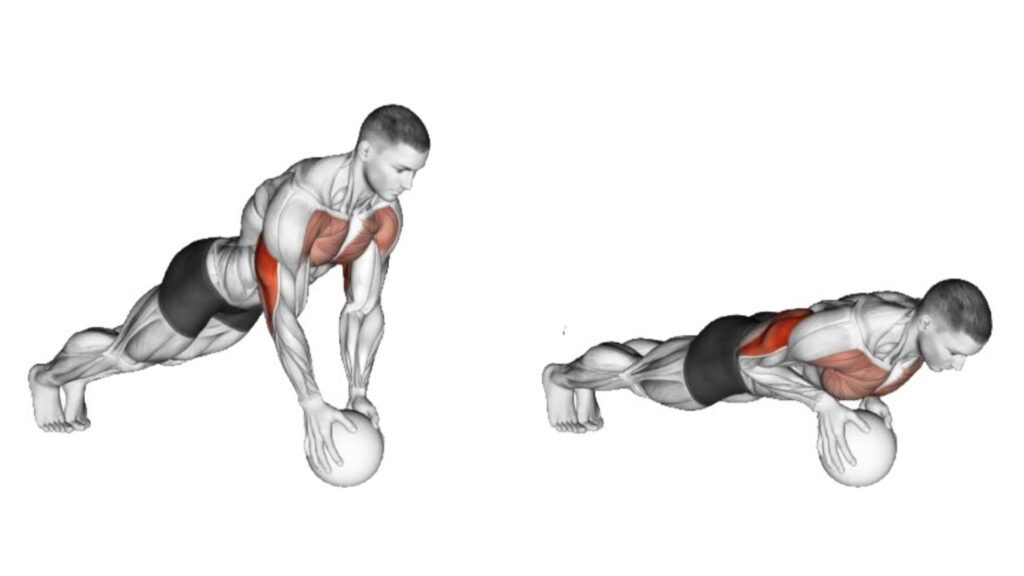
9. Stability Ball Push Up
Using a Swiss ball (or exercise ball) can bring an extra element to triceps pushups, giving you an uneven surface to increase the difficulty.
You’ll have to focus on keeping your balance on the ball, which allows you to work harder than you would if you were doing the standard push-up.
Push-ups with the hands placed on a stability ball significantly increased triceps brachii activation.
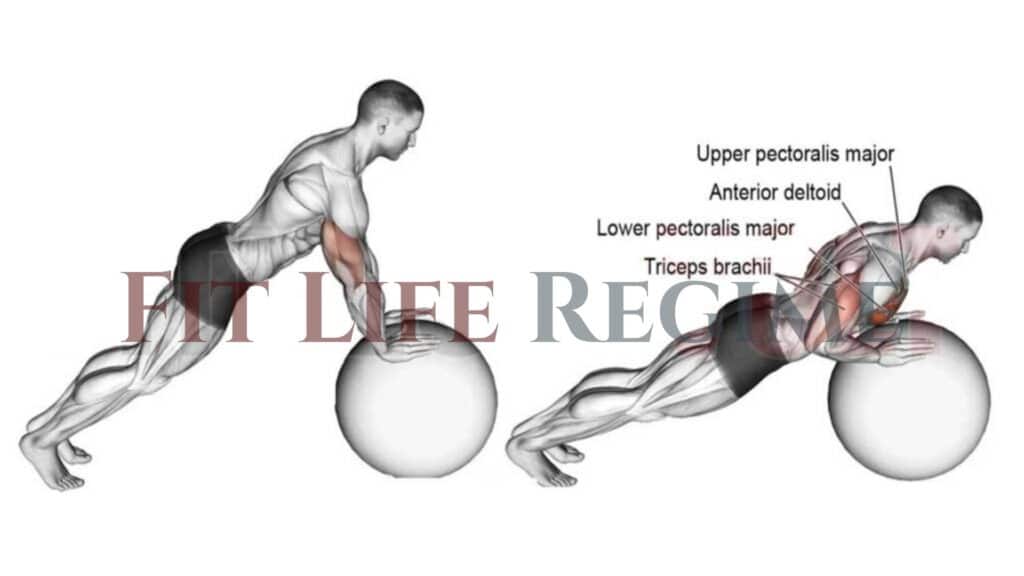
10. Single Dumbbell Push Ups
Single dumbbell push-up variations also improve grip strength, essential when handling heavy dumbbells.
This is a great full-body exercise because the abs, glutes, and thighs will contract in this position to support you.
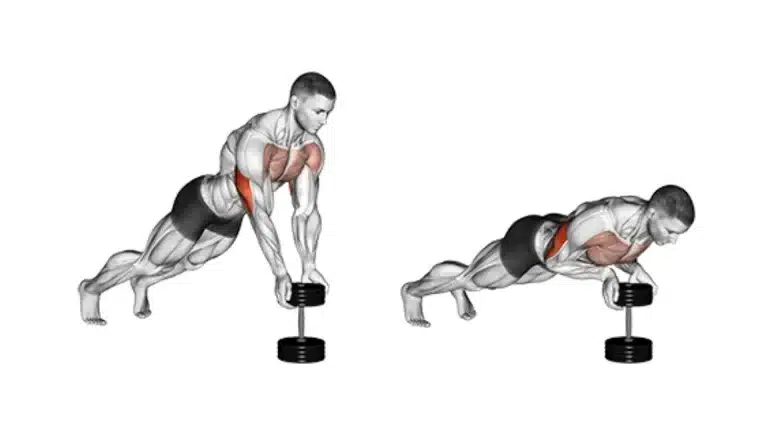
11. Cross Arm Push Up
Cross Arm Push-Up is a variation of the traditional push-up that targets the chest, triceps, and shoulders. The cross-arm placement added additional emphasis to the triceps muscles.
This variation is more advanced and should be approached with caution, especially for people who are new to push-ups or have shoulder issues.
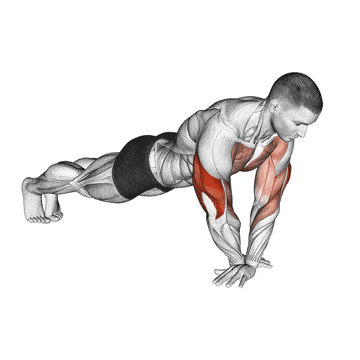
12. Bodyweight Skull Crusher
The bodyweight skull crusher is a compound exercise that targets the triceps muscles without needing weights or equipment. It can be performed using just your body and an open space.
Even though the name might make it sound chilling, it’s safe and effective when done correctly.
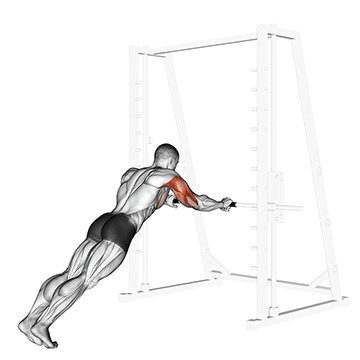
13. Tricep Floor Dip
This is the best tricep dip you can do at home on the floor. Although tricep dips on the floor are still a good workout, they require more reps to fatigue the triceps.
This is probably the least effective of the five, but it can be used as a variation if you don’t have a bench, chairs, or anything else to work with.
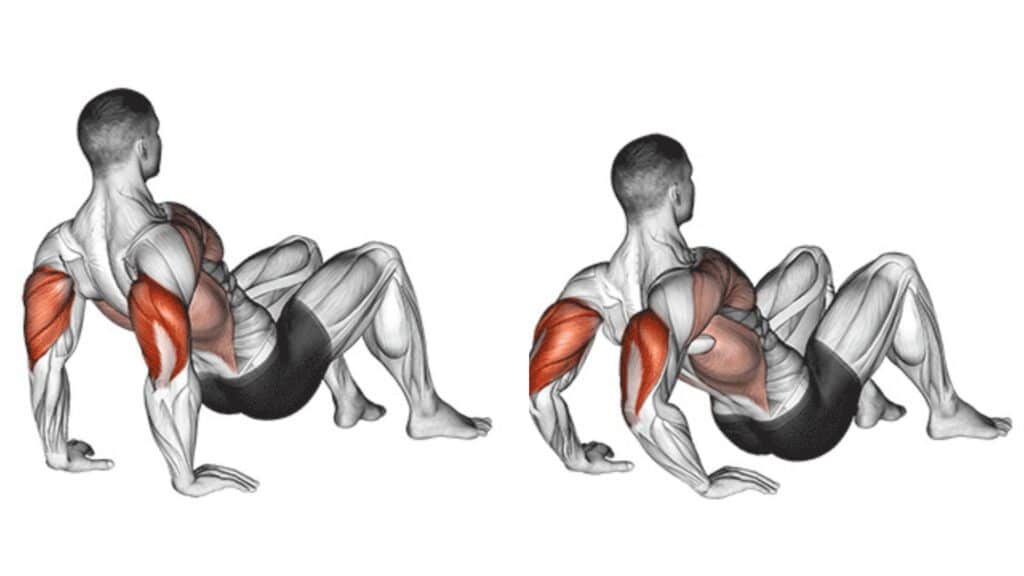
14. Bosu Push Up
Performing push-ups on a Bosu ball requires more excellent core stability and engagement. The unstable surface challenges your core muscles to work harder to maintain balance and control.
The Bosu ball, “Both Sides Up,” is a half-sphere stability training device with one side flat and another inflated.

15. One-Arm Push-Up
A one-arm push-up is a compound exercise that requires far more strength and balance than a standard push-up using two arms.
This variation allows you to train unilaterally (one side of your body at a time), typically an option with traditional pushups.
It just might be one of the most difficult body-weight exercises to master.
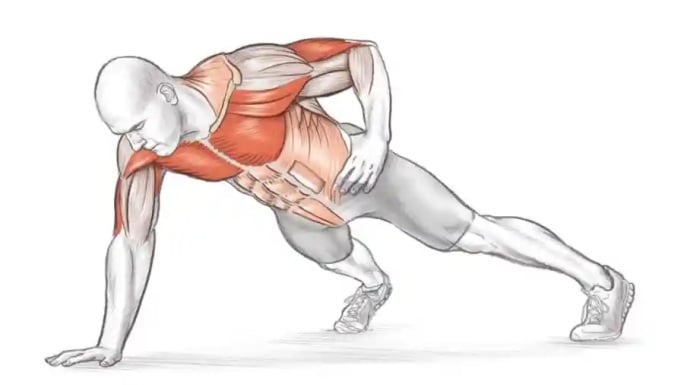
16. Side Push Up
Side push-ups are bodyweight exercises that work the chest, triceps, and core muscles. They focus on one side of the body at a time.
This exercise is good for strengthening your arms and chest. It is hard because you focus on one arm and one side of your chest.
It’s a good way to strengthen your upper body by adding weights to your workout routine.
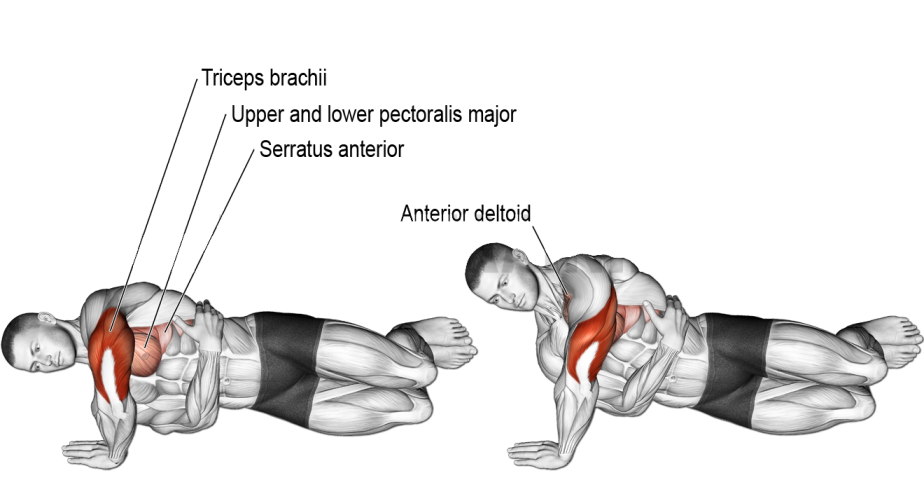
Bodyweight Leg Exercises Names
Bodyweight training helps build strong, muscular legs through challenging exercises that use your weight as resistance.
This glossary provides an overview of popular bodyweight leg moves, such as squats, lunges, pistol squats, and calf raises.
Let’s build stronger legs with no equipment required!
1. Bodyweight Squat
If you’re looking for straightforward bodyweight leg exercises to add to your routine, the bodyweight squat is a great staple exercise to get you started.
The bodyweight squat is a strengthening exercise that can be performed virtually anywhere without equipment and limited space. This exercise uses every major muscle in the legs, making it incredibly functional.
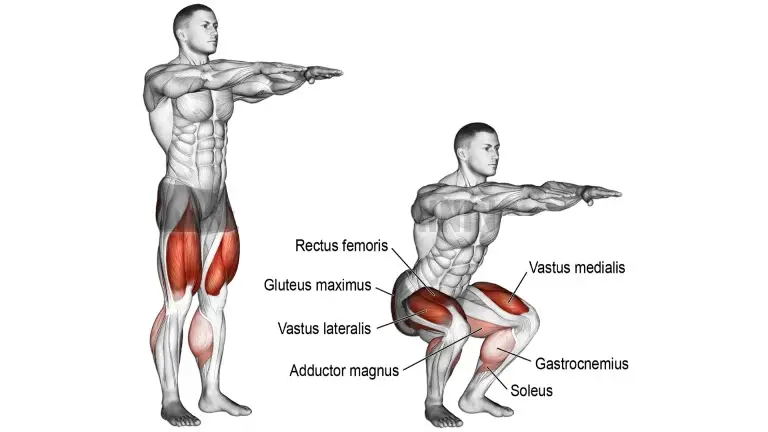
2. Bodyweight Sumo Squat
The Sumo Squat is another great exercise for your bodyweight leg workout. It is a variation of a standard squat.
The key difference in this squat is that you take a wider stance and position your feet turned out.
While all squats work the glutes, hip flexors, quads, hamstrings and calves, the leg positioning of the sumo squat also works the inner thighs.
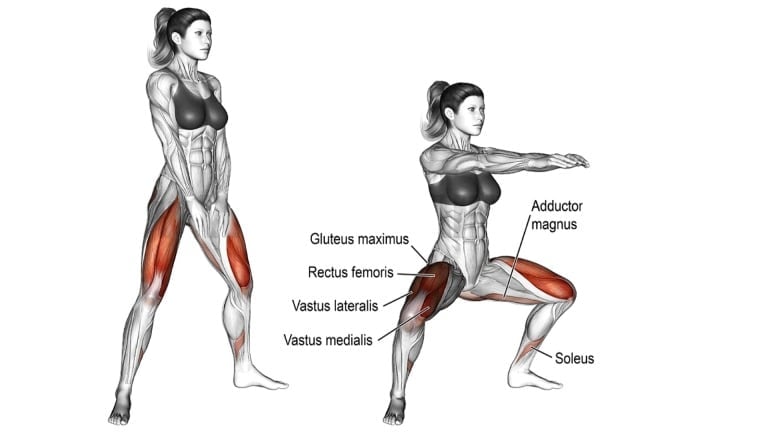
3. Lunges
Bodyweight Lunges are an excellent leg exercise for building thigh and glute muscles. Along with squats, lunges are highly recommended for building mass in your butt and quad muscles.
It requires good balance, so if you have issues keeping your balance, start off by doing the lunges exercise without weights as you learn the proper form.
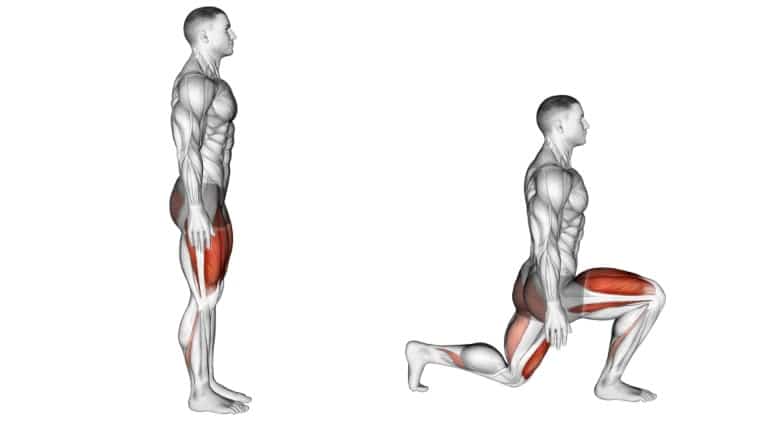
4. Step Up
The step-up is a great exercise for building legs strength and power. This exercise targets quads and also involves calves and glutes & hip flexors.
The step-up is a great exercise for everyone because it can be changed to make a tough workout for anyone, no matter how old or new they are to exercising.
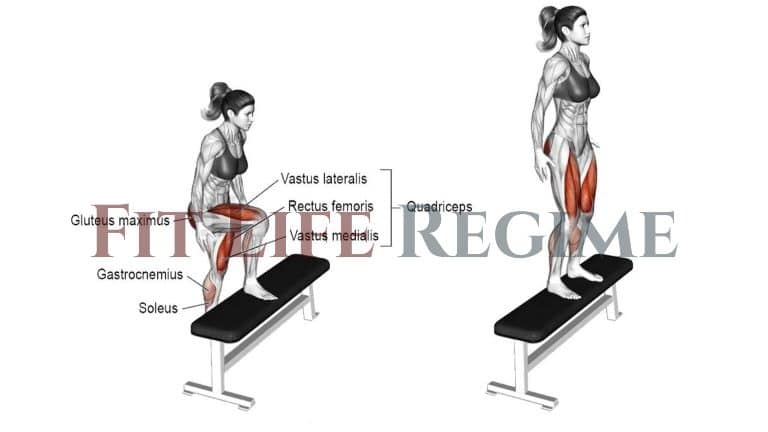
5. Jump Squat
Jump squats, also known as squat jumps, are the power—packed HIIT version of squats.
Their variations help shed fat from the body, tone the butt and legs, and improve strength and balance.
Squat jumps are a great leg exercise to include in in-home workouts since they can be done in a small space without any equipment.
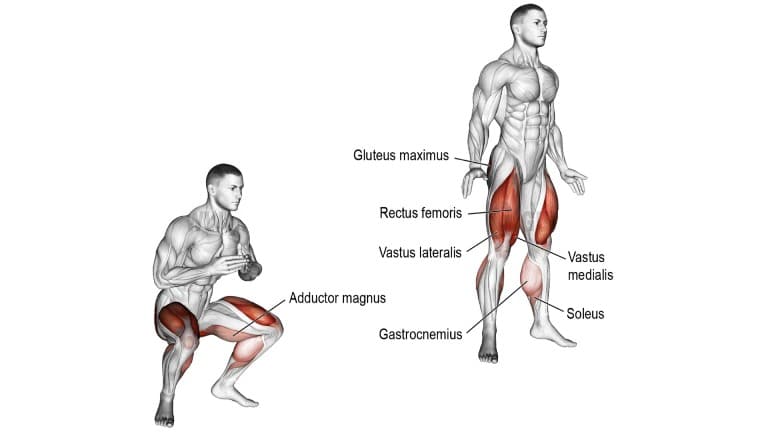
6. Inverse Leg Curl
If you’re looking for a way to get more creative with hamstring exercises for mass, why not try an inverted leg curl?
It is an unconventional hamstring exercise that isn’t common, but that doesn’t make it any less effective.
The inverse leg curl (bench support) uses your body weight to work the hamstrings and is just as, if not more, challenging to do.
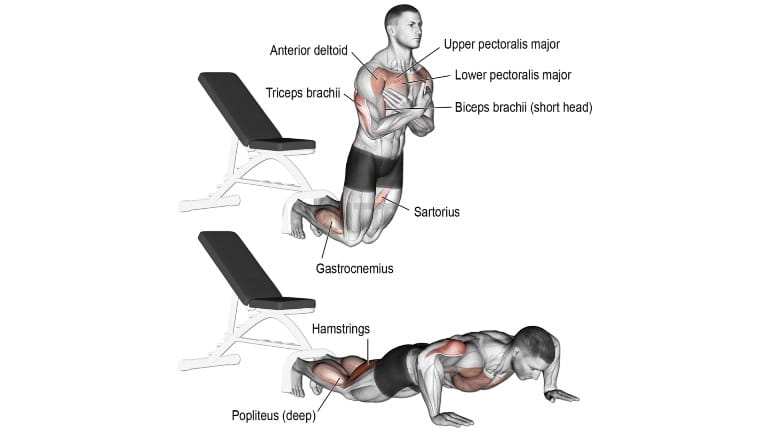
7. Hip Thrust
The hip thrust is a popular exercise that targets the glutes and hamstrings to build muscle and strength.
Try doing more challenging bodyweight hip thrust leg workouts.
- Single-Leg Hip Thrust
- Band-Resisted Hip Thrust
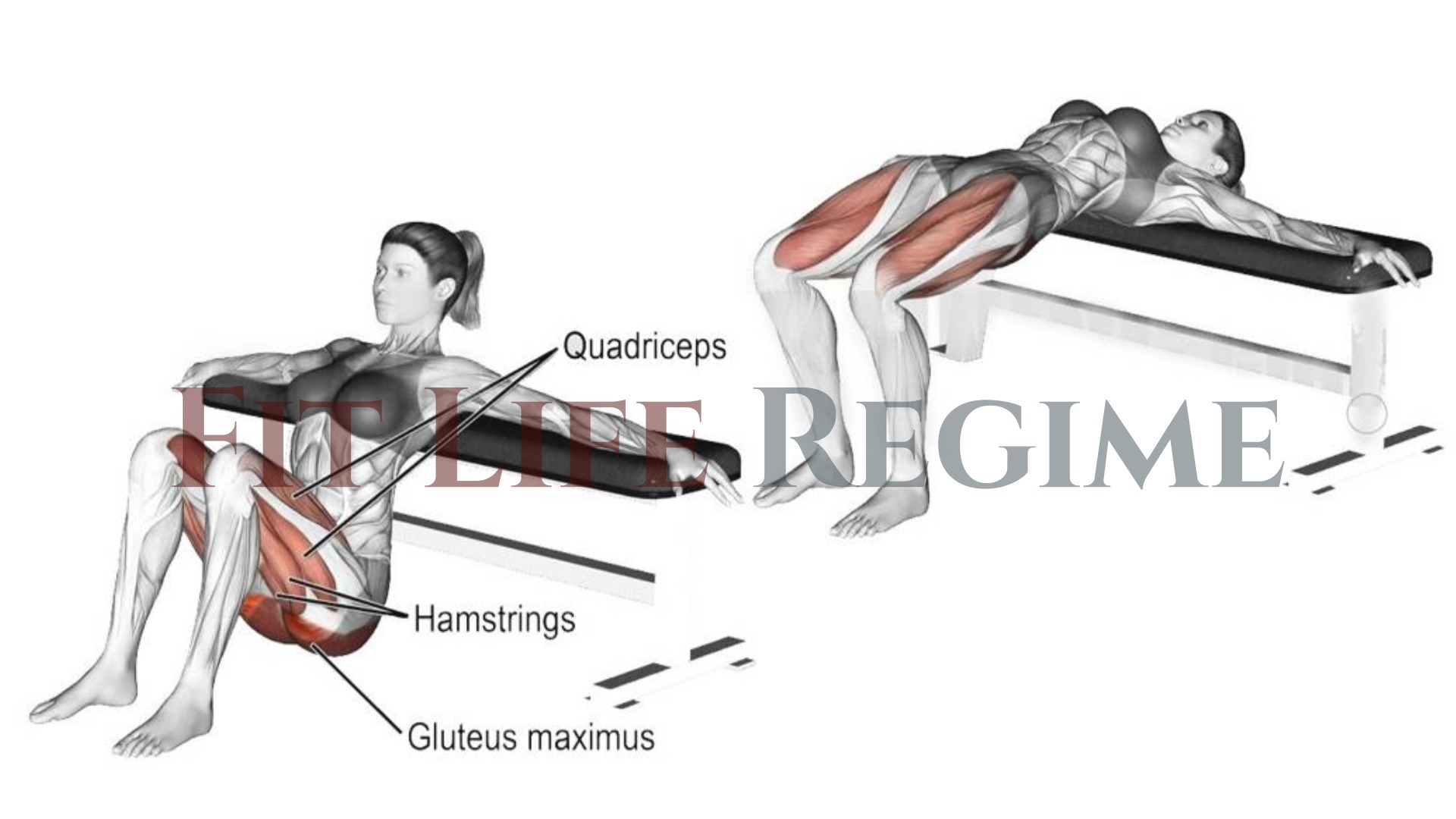
8. Bulgarian Split Squat
It is an effective auxiliary exercise for improving your squat and lunge. It is also great for enhancing your balance and developing unilateral functional strength.
To promote equal contralateral strength (equal strength in both sides), start with your weak leg, and do not do more repetitions with your strong leg.
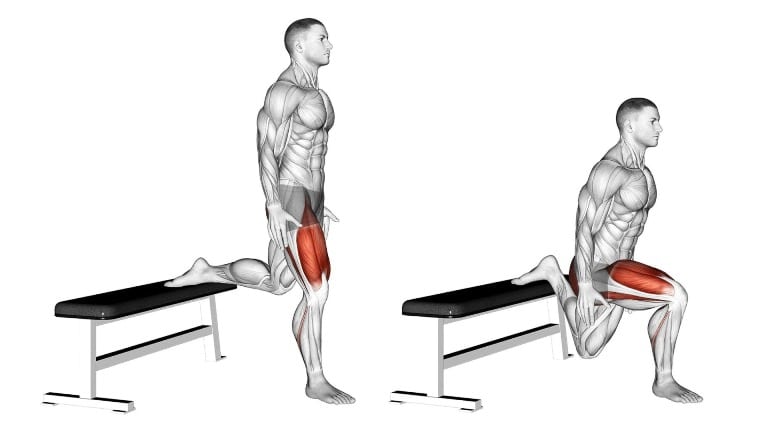
9. Jumping Rope
Jumping rope utilises muscles that the seated calf raises miss. It builds endurance, strength, and coordination for the calf muscles.
Furthermore, jumping rope provides endless variations to keep the exercise challenging.
To jump rope, the individual must first ensure the rope is appropriate for their height.
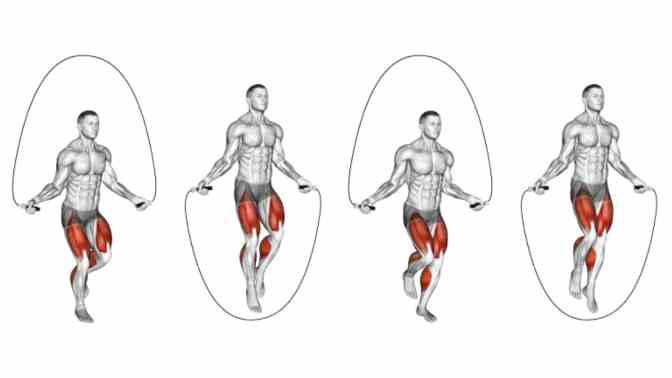
10. Box Jump
The box jump is a plyometric exercise that develops an athlete’s lower body explosiveness and proprioception.
Plyometric exercises like the box jump help improve explosiveness. They combine power and speed to output force from the exerciser’s body.
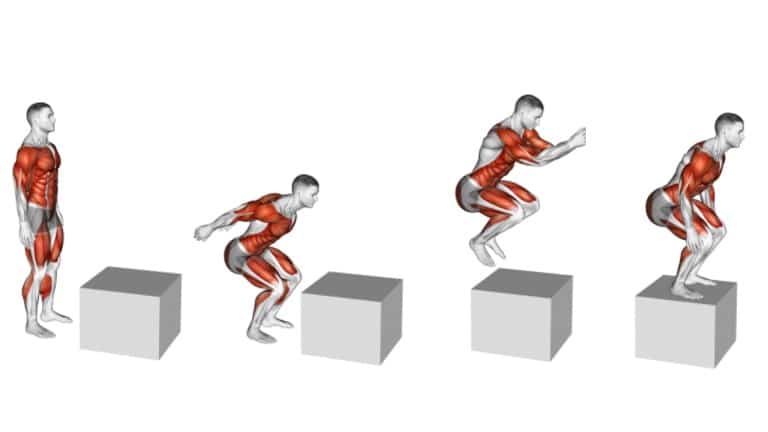
11. Squat Hold Calf Raises
Squat-hold calf raises work the soleus muscles more than the gastrocnemius, but the latter still produces considerable force.
- Assuring a squat position with your feet shoulder-width apart would be best.
- And your hands in front of or on your hips.
- Squat and push up to stand on your toes before returning to the ground.
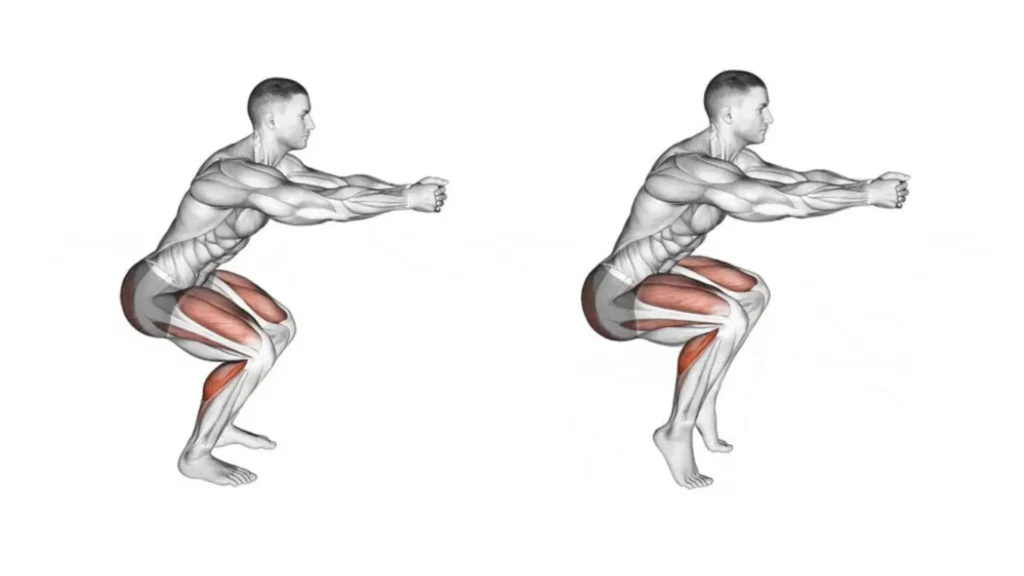
12. Bodyweight Standing Calf Raise
Bodyweight calf raise exercises effectively strengthen your calves because the calf muscles take on so much of your bodyweight.
You only use bodyweight, so they’re a convenient calf exercise you can do at home or anywhere.
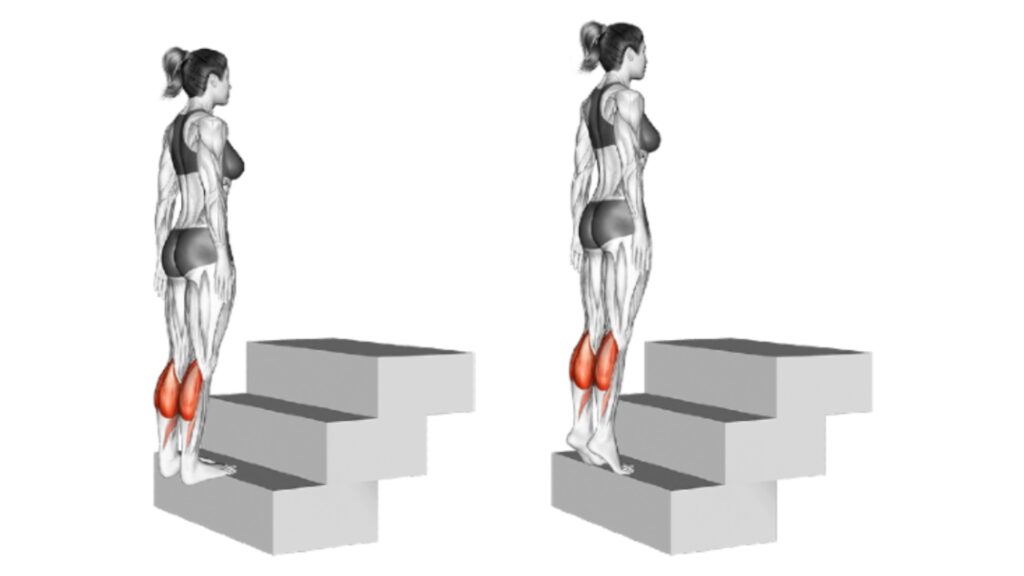
13. Donkey Calf Raises
Donkey calf raises are an excellent bodyweight calf raise exercise for building calf muscles. This raise is mostly the second option after standing calf raises.
- It primarily engages the two muscles comprising the calves: the gastrocnemius and the soleus.
- It secondarily activates the hamstrings and abs. When you bend over to initiate the calf raise, the hamstrings receive a stretch.
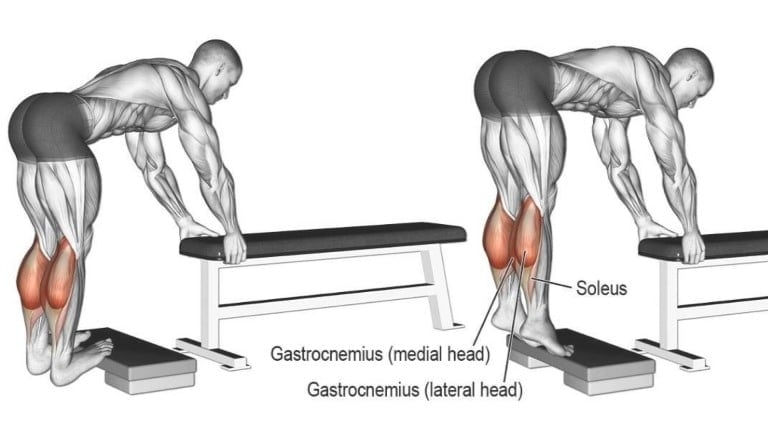
14. Pistol Squats
Pistol squats, also known as single-leg squats, are challenging bodyweight exercises that require strength, balance, and flexibility.
The unilateral movement strengthens the glutes, quadriceps, hamstrings, hip adductors (the muscles along the inner thigh), calves, and core muscles through a full range of motion, while training balance and stability.
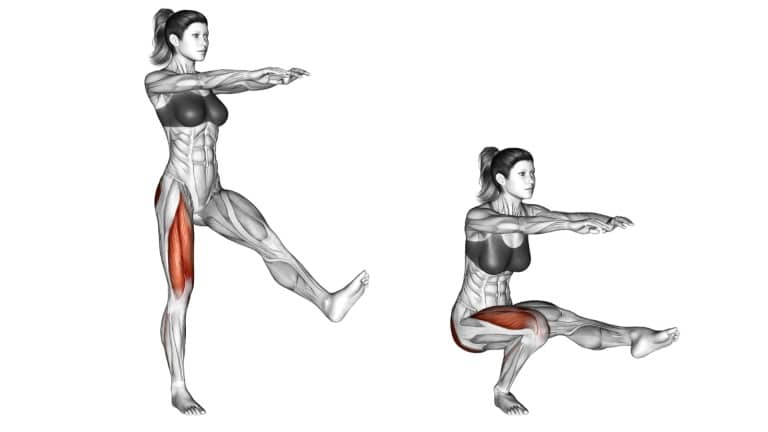
15. Wall Squat
Wall sits are a great bodyweight exercise that targets the quadriceps, glutes, and calves.
They are static exercises that involve holding a seated position with your back against a wall and can be performed anywhere on a flat surface.
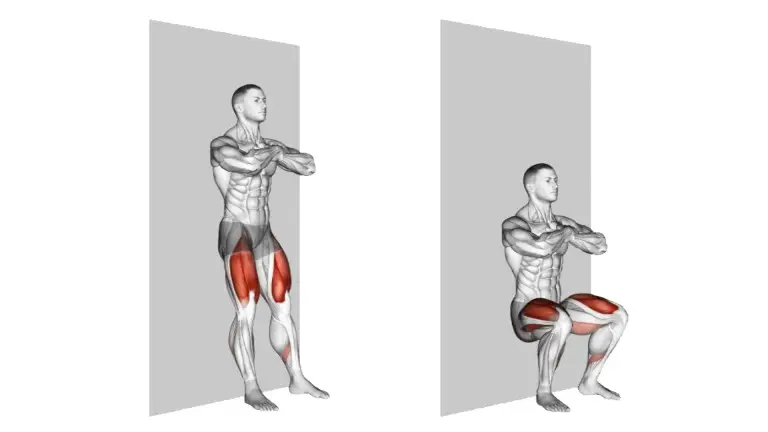
16. Kneeling Leg Extension
The kneeling leg extension is a highly functional bodyweight exercise that targets the quadriceps muscles while also engaging the knee joint, lower back, and hamstrings.
It is a simple exercise that can be performed anywhere without any equipment.
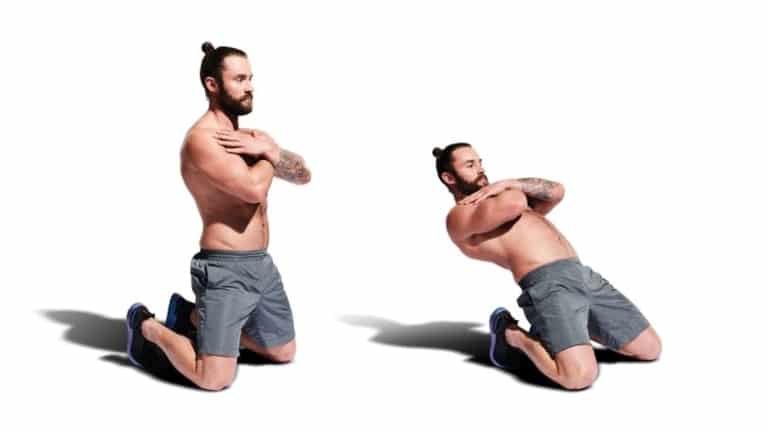
17. Side Lunge
The bodyweight lateral lunge is the best variation of the bodyweight lunge, which people typically perform when they want a little more glute involvement in the movement pattern.
The unilateral movement of side lunges can help you to improve muscular imbalances, increase strength in each leg, and benefit from a functional movement.
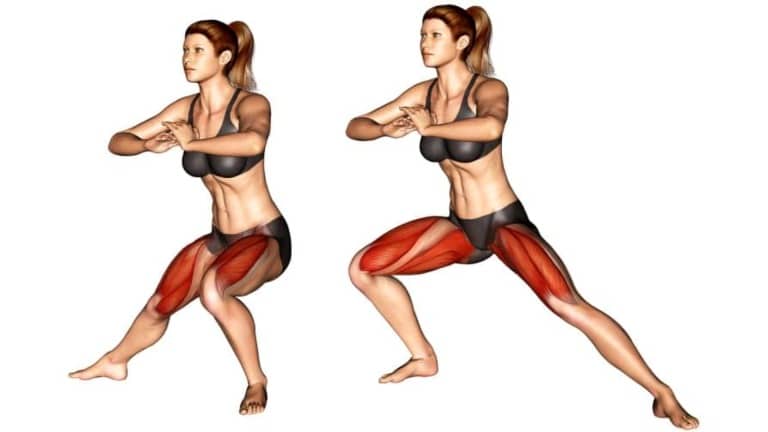
18. Seated Knee Extension
Seated knee extensions are a commonly prescribed exercise in physical rehabilitation programs.
This exercise isolates the knee extension mechanics to gently strengthen the knee joint and quads with minimal impact or excessive movement.
Seated knee extensions are particularly useful when the knee has a limited range of motion or when other leg parts need to remain immobile during rehabilitation.
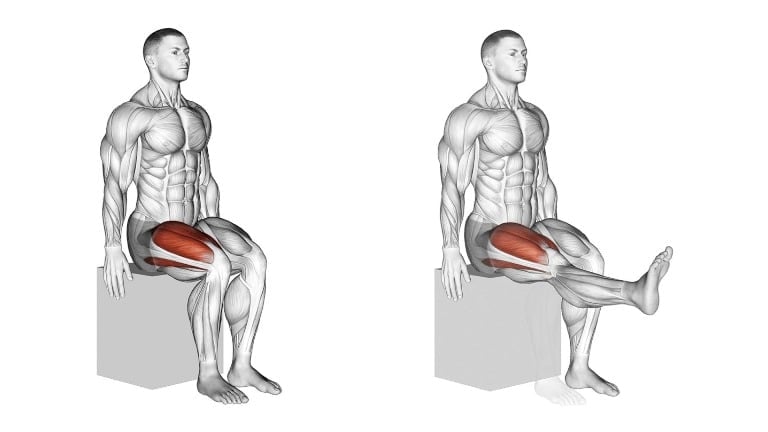
Name Of Bodyweight Abs Exercises At Home
This list shows 35+ ab exercises you can do at home without special equipment or machines—just your body weight!
You can get strong and toned abs at home. You must know how to make the best moves to work your rectus abdominis, obliques, and transverse abdominals.
Bodyweight abs exercises are versatile and can be matched to your strength level.
It ranges from basic crunches and leg raises to more demanding planks and V-ups.
1. Crunch
Crunches are one of the all-time favorite ab exercises you can do at home, but they have been linked to risks if done with improper form.
The crunch motion occurs in the upper spine, and your shoulders rise a few inches off the floor. Your lower back remains in contact with the floor, and the hips have no motion.
This contrasts with the sit-up, where the movement occurs at the waist and hips.
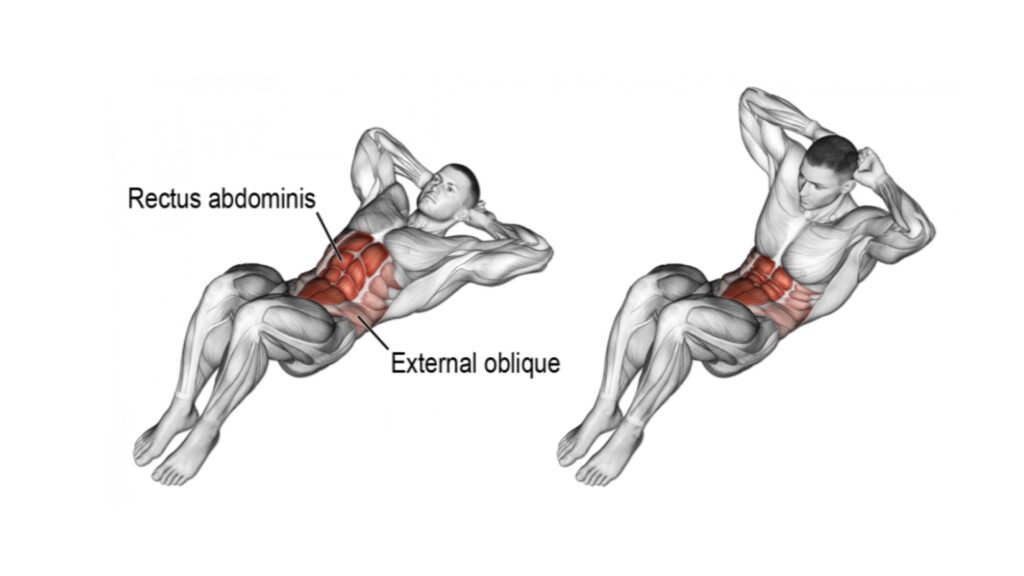
2. Bicycle Crunch
In 2001, ACE sponsored a study to determine the best abs exercise. The study compared 13 of the most common moves, and the bicycle crunch was found to be the most effective.
Compared with the standard crunch, the bicycle crunch produced 148% more mean activity in the abs and 190% more mean activity in the obliques.
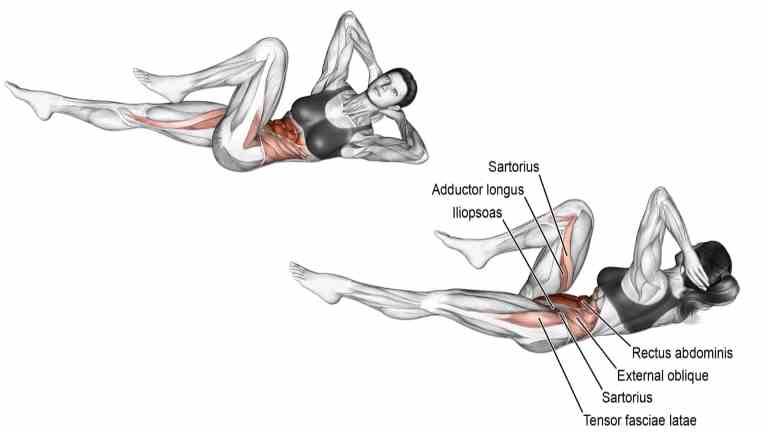
3. V-Up
The V-Up, also known as a jackknife, is a great abs exercise to add to your home workout routine. It is a full-body move that works your core, legs, back, and shoulders.
The exercise works the upper and lower abs muscles simultaneously. To do it at home, sit on the floor or a mat and position your body in a V shape.
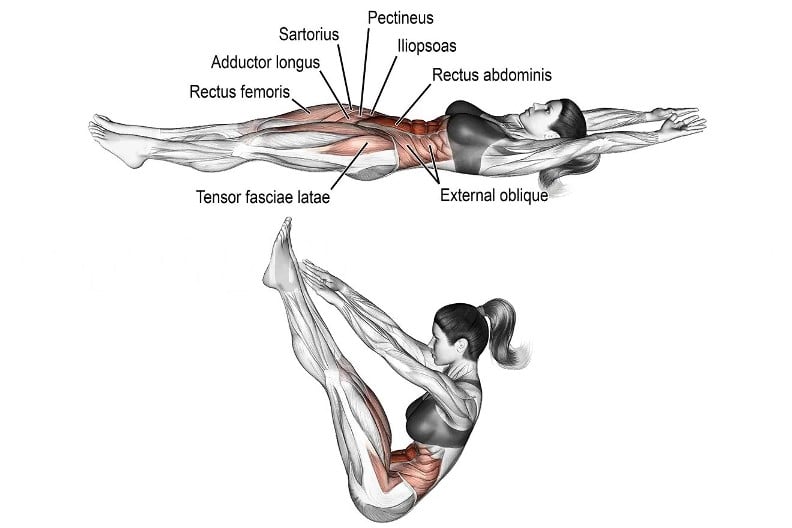
4. Mountain Climber
Mountain climbing is an explosive bodyweight exercise that engages multiple muscle groups simultaneously, helping to improve balance, coordination, strength, and flexibility.
It is a great way to improve cardiovascular endurance and burn calories to get six pack abs.
It’s particularly effective for strengthening your core muscles, including the abs, transverse abdominis, and obliques.
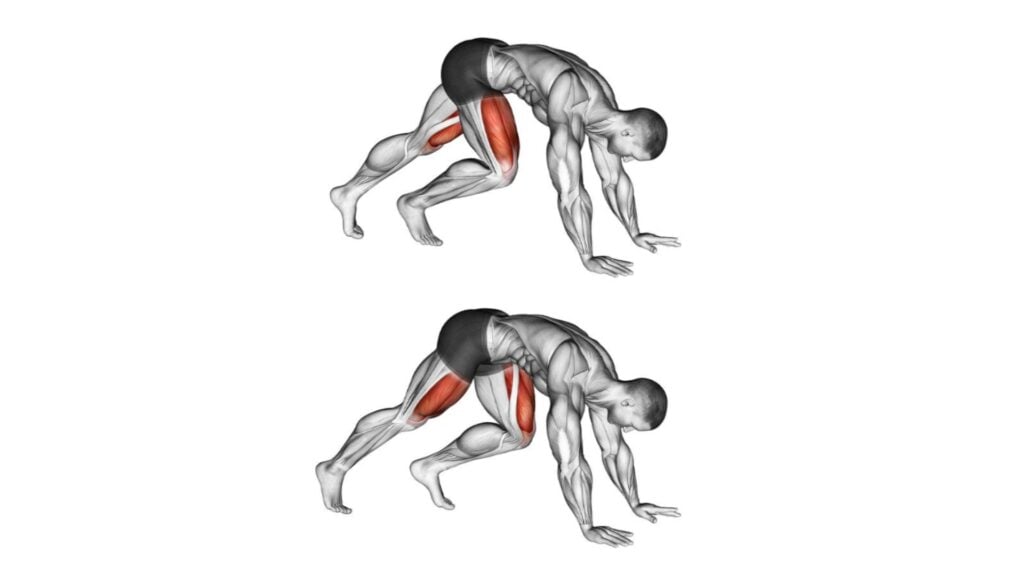
5. Russian Twist
The Russian twist is a great way to make your abs exercises at home more interesting. It engages your core and strengthens your abdominal and lower back muscles.
This exercise helps to tone and tighten your abs and obliques and trim your waist. It also improves your balance, stability, and posture.
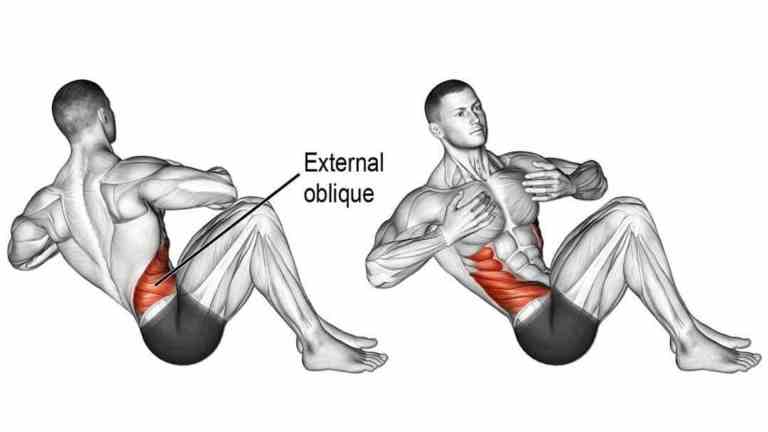
6. Lying Straight Leg Raise
If you are looking for an effective exercise for targeting the lower abs, lying straight leg raises are a great option. They are safe and easy to do and can be done at home or in the gym.
Lying leg raises can also help alleviate lower back pain by improving the strength and stabilisation of the core.
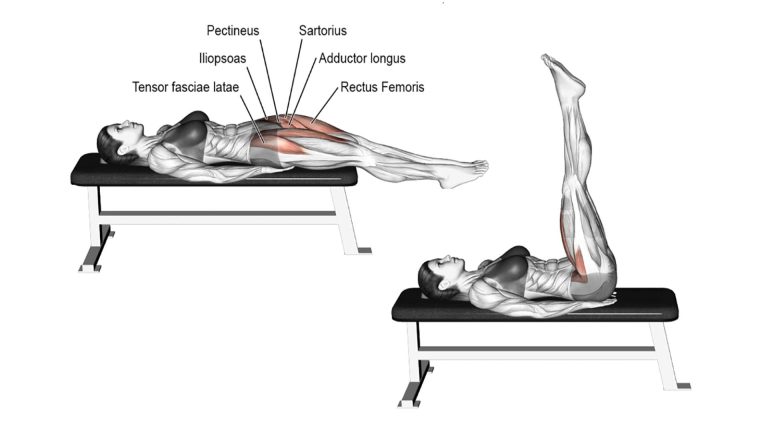
7. Reverse Crunch
The reverse crunch is a challenging core exercise that primarily hits your lower abs.
The reverse crunch is an intermediate-level abs exercise. It is a variation of the crunch but done in the opposite direction.
- In a crunch, you curl your upper body up towards your knees.
- In a reverse crunch, you curl your lower body up towards your chest.
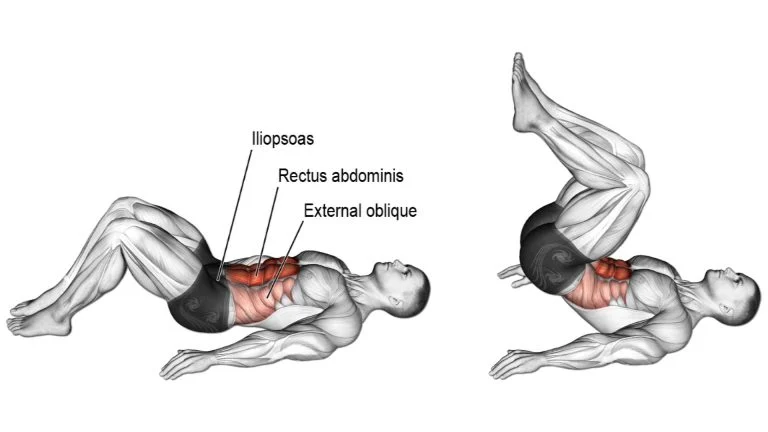
8. Oblique Crunches
Oblique crunches are an effective exercise for strengthening and toning the obliques on the sides of your abdomen. muscle groups
While they don’t directly reduce fat (as spot reduction is a myth), stronger obliques can lead to a more toned and defined waistline when combined with proper nutrition and overall body fat reduction.
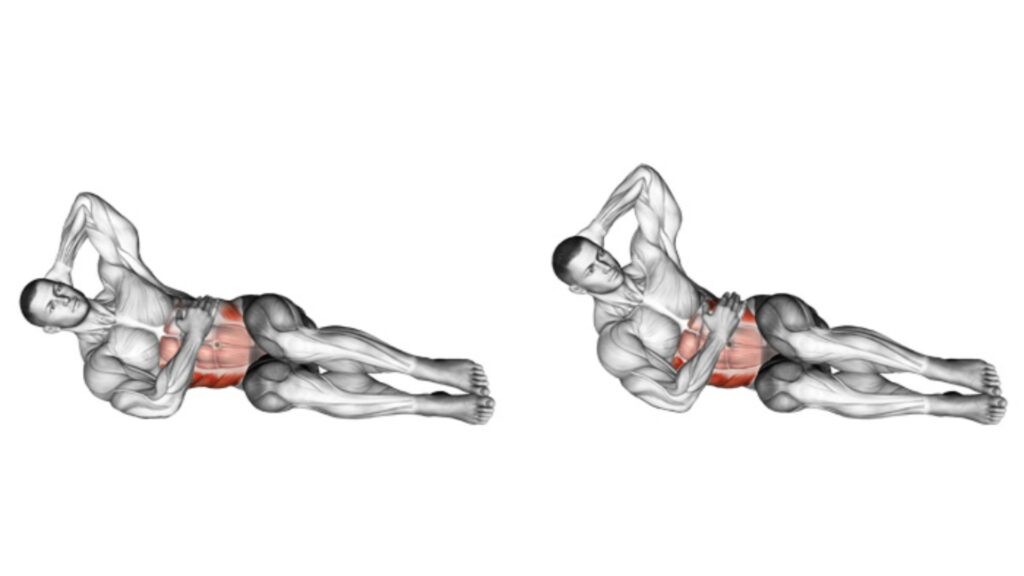
9. High Knee
High Knee is an excellent cardiovascular exercise that is popularly practised worldwide. This exercise might look easy to perform, but it is a challenging move that targets multiple muscle groups in the body.
It recruits the abs and core muscles greatly, eventually making it more effective to build six-pack abs.
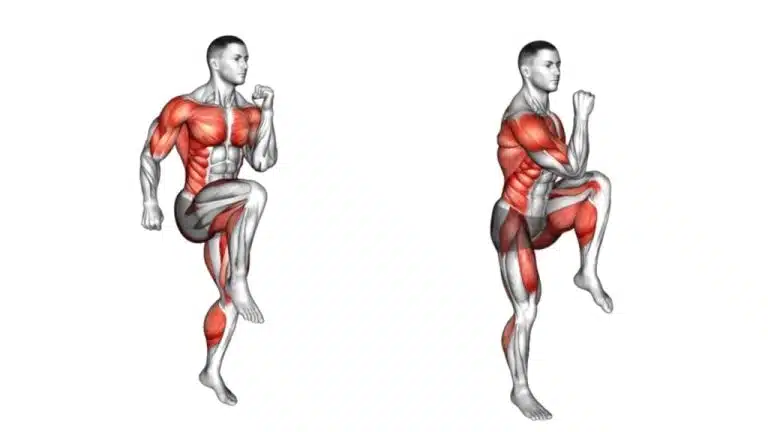
10. Plank
The plank, or planking, is an isometric core strength exercise that involves maintaining a position similar to a push-up.
It is an exercise that works your core muscles and improves your strength, balance, and endurance.
Crunches and sit-ups only work the muscles on the front side of the core, so back-strengthening exercises are necessary as well. However, planks work the entire core and many other muscles in the body.
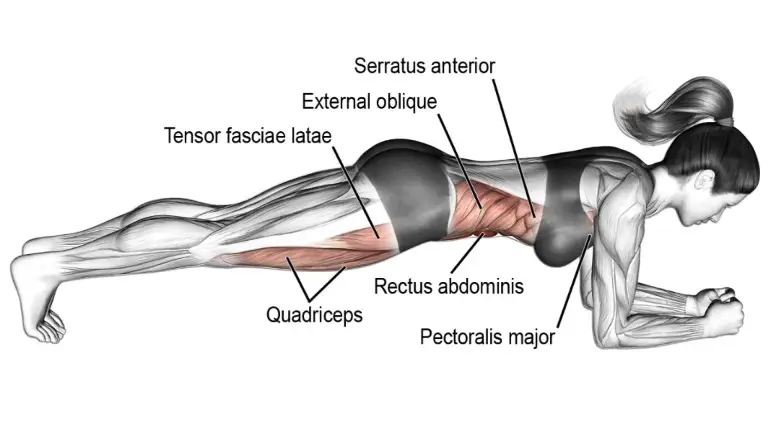
11. Side Plank
The side plank is one of the best abs exercises for strengthening the oblique muscles, which don’t get worked as much during abs exercises such as crunches. Strong obliques are quite useful as core stabilization muscles.
- If you’re new to planking, you should master the basic forearm plank before moving on to the side plank variation.
- If you find it hard to hold a side plank, that’s OK. You can try knee-side plank instead of forearm-side plank.
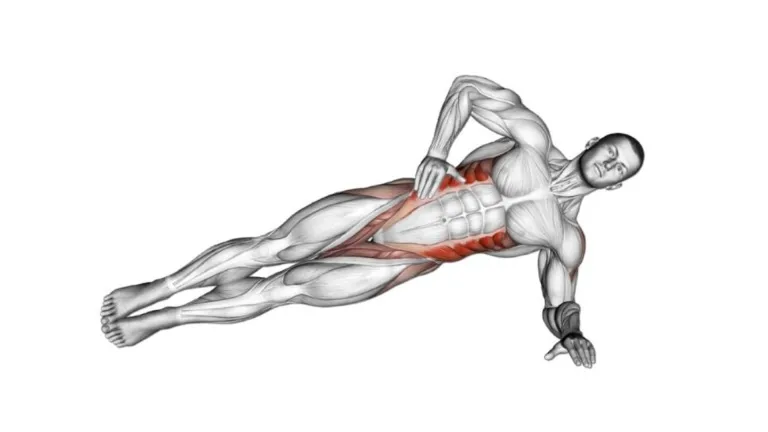
12. Lying Bent-Knee Oblique Twist
Lying Bent Knee twist is a beginner-friendly bodyweight exercise that builds muscle and strength in the obliques. This is a great moderate move that, when done correctly, can effectively target your core and abs.
You can do the weighted version of the exercise with a ball in between your legs.
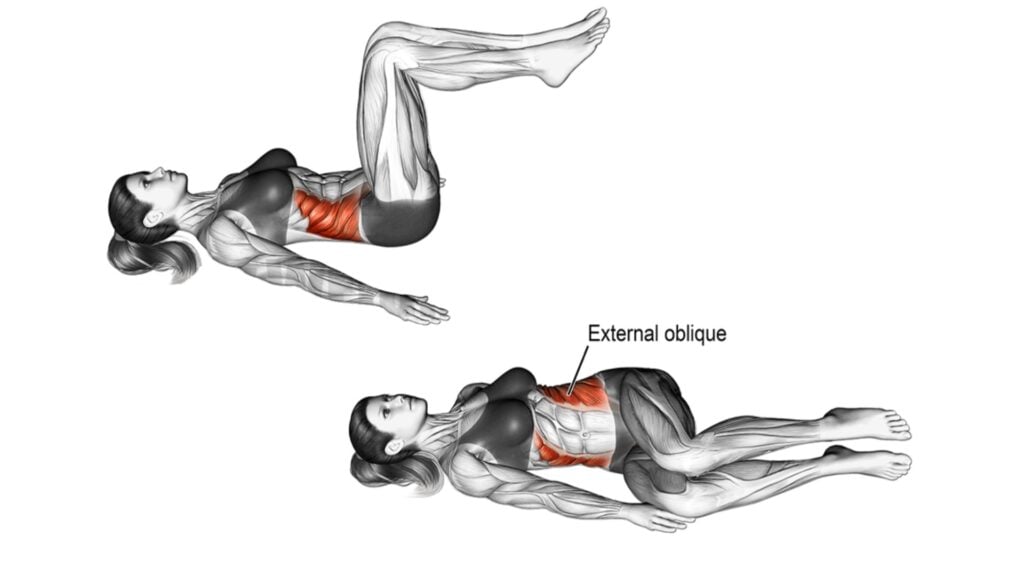
13. Cross-Body Mountain Climber
This variation emphasizes the oblique muscles more than the standard mountain climber, enhancing the waistline. It involves moving your knees diagonally towards the opposite elbow.
The exercise works all the muscles in the body, including the abs, shoulders, chest, and legs. It’s a complete workout for everyone.
Cross-body mountain climbers increase your heart rate, making them a great addition to a high-intensity interval training (HIIT) routine.
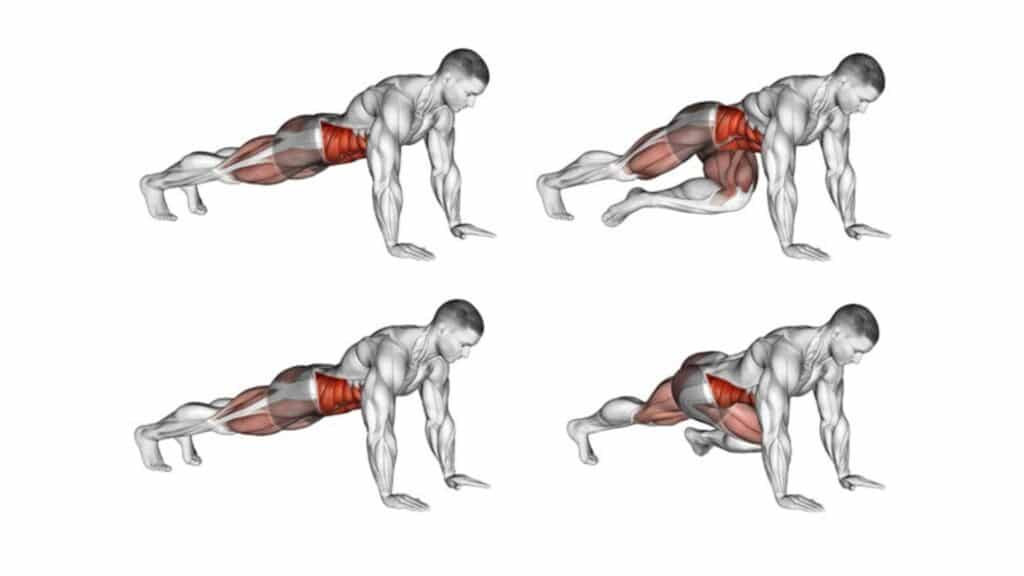
14. Alternate Heel Touch
Alternate heel touches, also known as lying oblique reach, are at-home workout exercises that target the oblique and also involve abs.
It is one of the great side abs (oblique) exercises that a beginner can do easily to activate and grow their midsection.
The exercise mimics other oblique exercises, such as the dumbbell side bend and oblique crunch.
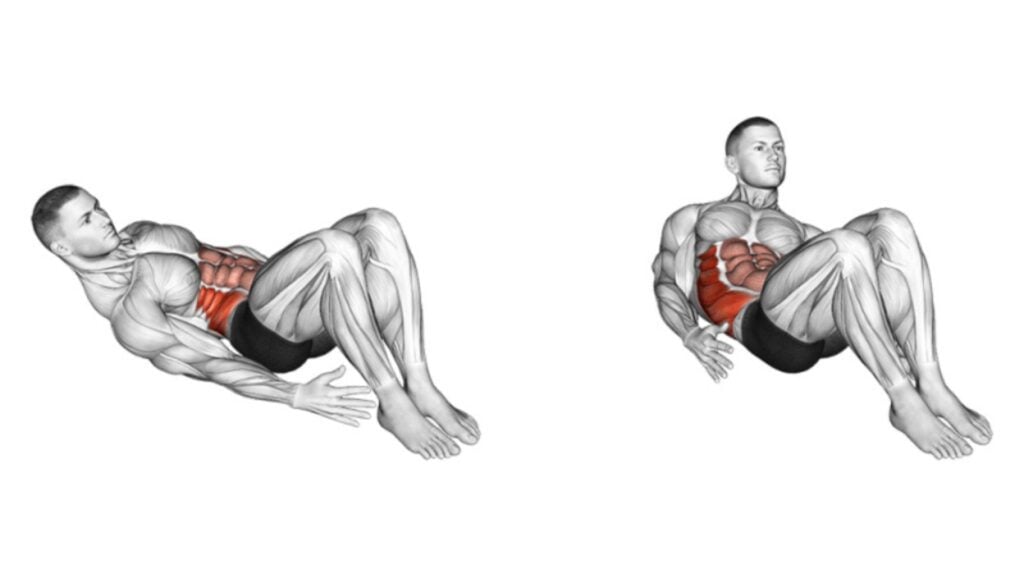
15. Inchworm
The inchworm is a total bodyweight workout requiring minimal equipment and space. This full-body movement is an effective exercise to include in a warm-up routine or as a part of a training circuit.
Inchworms are a great ab exercise for beginners and don’t require any equipment. They also improve flexibility in your hamstrings and build strength in your shoulders, chest, and core.
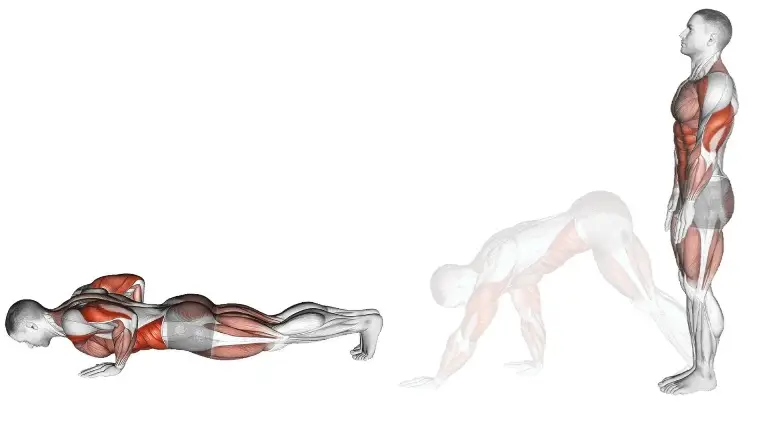
16. Seated Knee Up
Seated Knee up is an essential part of any lower abs workout routine.
If you want to build six-pack abs or increase your core strength, seated knee tucks are for you!
For the most effective execution, keep the trunk stable and bring the knees as close to the chest as possible.
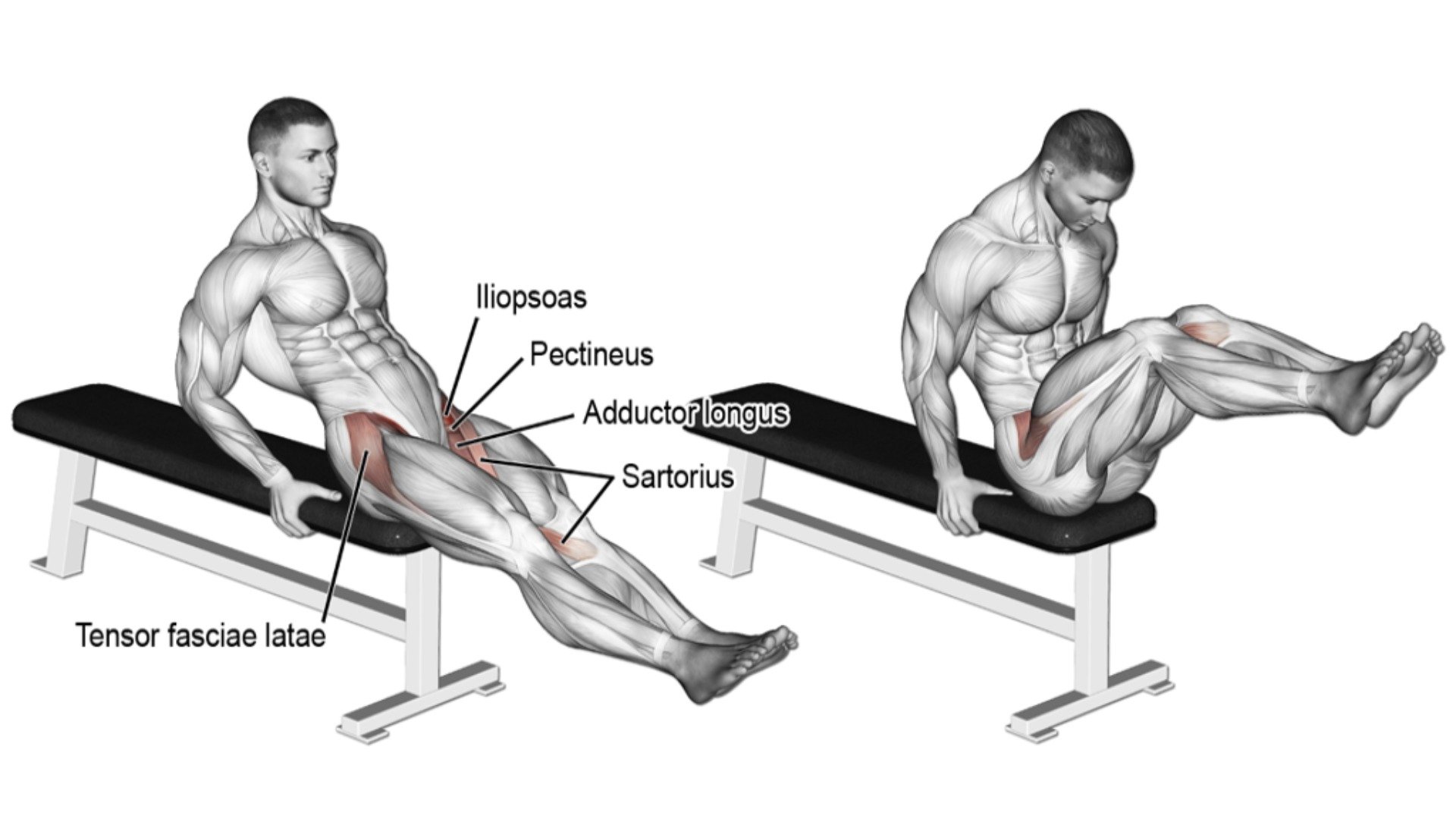
17. Dead Bug
The dead bug exercise is popular for building core strength and stabilization.
This move also helps prevent and relieve low back pain by strengthening the lower back and abs.
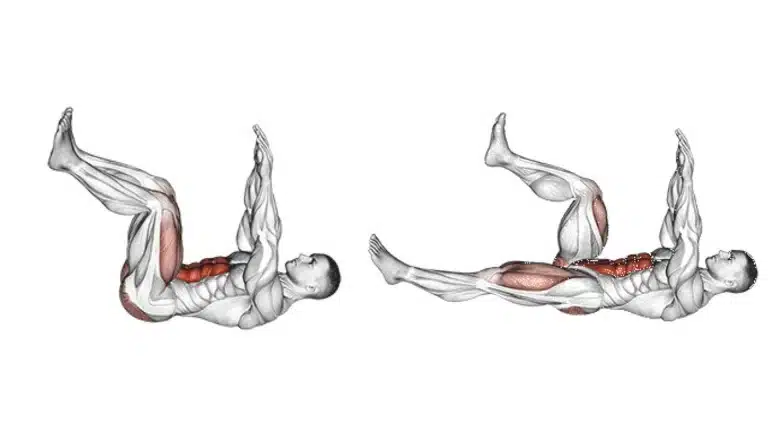
18. Flutter Kick
Flutter kicks are an exercise that targets the lower abdominal wall plus the hip flexors.
Although the traditional flutter kick can be done without equipment, you may want to consider enhancing the exercise by wearing ankle weights
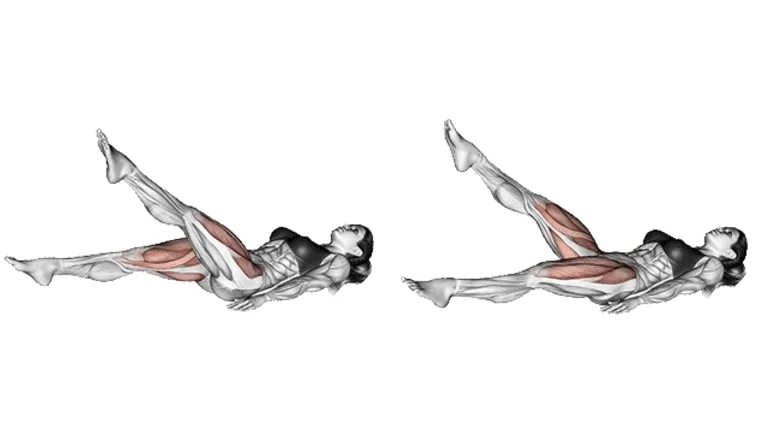
19. Scissor Kicks
It is great for targeting both the lower abs and the obliques. The criss-cross motion will also give you a good stretch in your hip flexors and hamstrings.
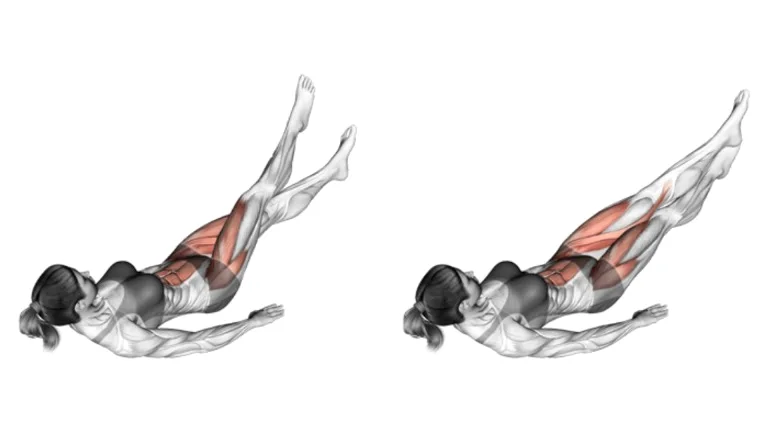
20. Toe Touch
There are actually two main versions of toe touches:
- Lying leg raises with reach: This is the most common type, where you lie on your back with your legs extended and reach up towards your toes (or as far as you can comfortably).
- Sitting toe touches: In this variation, you sit on the floor with your legs extended and reach forward to touch your toes, bending at the hips.
Lying toe touch is a great exercise for those who want a more challenging workout.
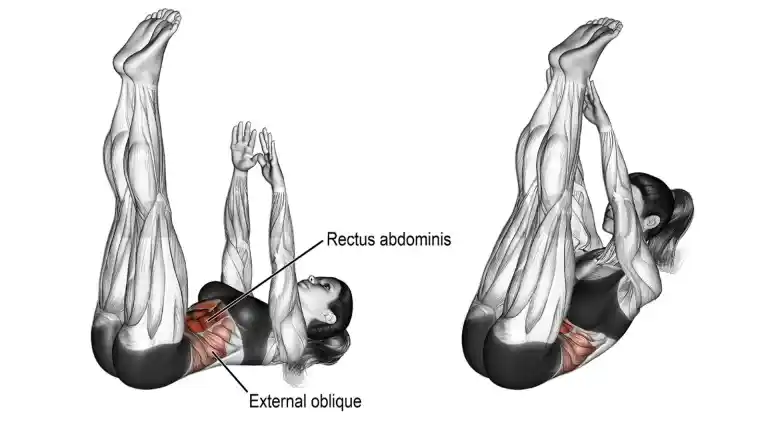
21. Sit-Ups
Sit-ups are an excellent choice for creating muscular tension in your upper abs. They help strengthen your abs, transverse abdominis, obliques, hip flexors, chest, and neck.
They promote good posture by working your lower back and gluteal muscles.
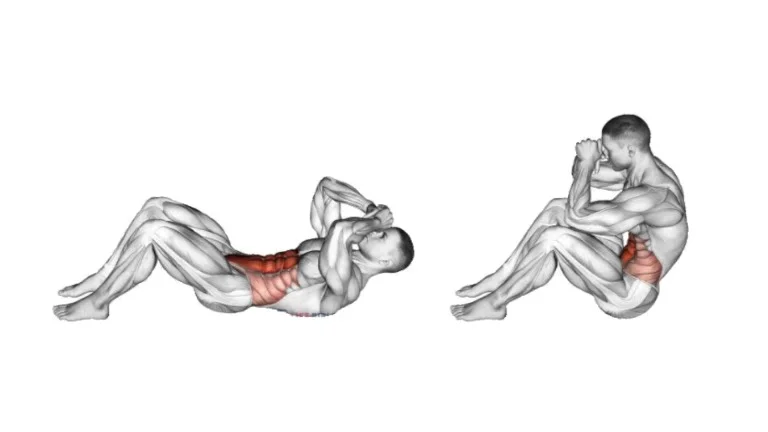
22. Elbow To Knee Side Plank Crunch
The Elbow-to-Knee Side Plank Crunch helps you develop the strength and stability of your abs and obliques.
Combine your standard crunches with side plank exercise into one move that will challenge your balance, tone up your waist, and strengthen your core.
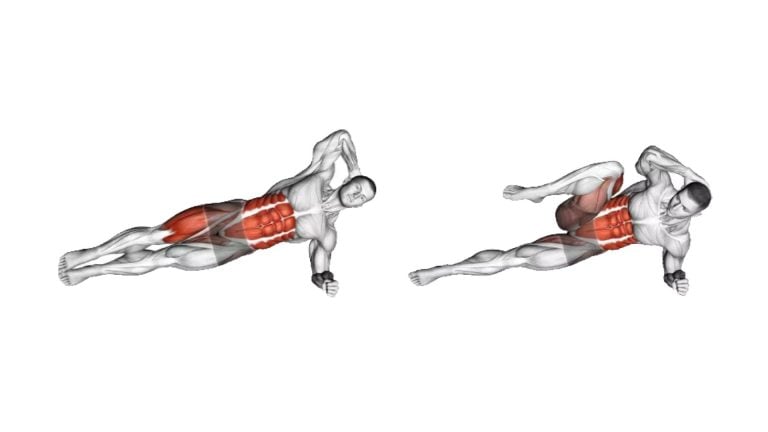
23. Forearm Side Plank Crunch
Combine your standard crunches with side plank exercise into one move that will challenge your balance, tone up your waist, and strengthen your core.
The side of the body closest to the ground has to stay engaged the whole time to keep the body stable, while the side you’re crunching contracts and relaxes repeatedly.
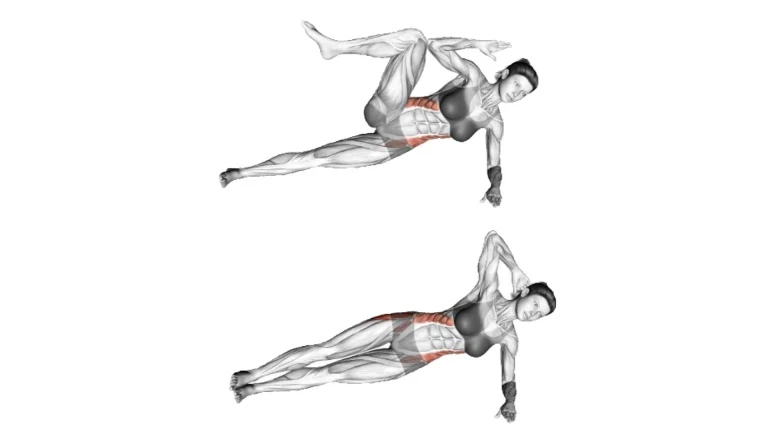
24. Plank Jack
The plank jack combines two very common exercises: the plank and the jumping jack.
It combines cardio and core-strengthening exercises, which can help strengthen the upper and lower body muscles.
Adding plank jacks to your exercise routine a few times a week may also increase core strength and stability, burn calories, and help reduce fat.
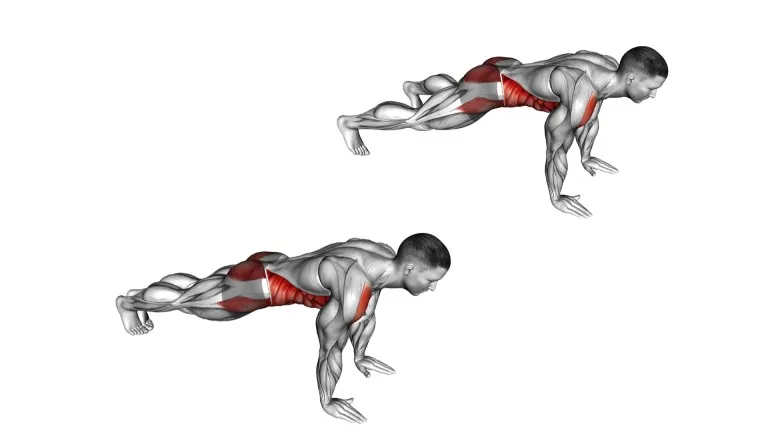
25. Standing Side Crunch
Oblique crunches are done while standing to help build strength and stability in the obliques and abdominal muscles. They also excellently improve balance.
Whether you are a beginner or an experienced exerciser, these crunches are a great addition to your routine.
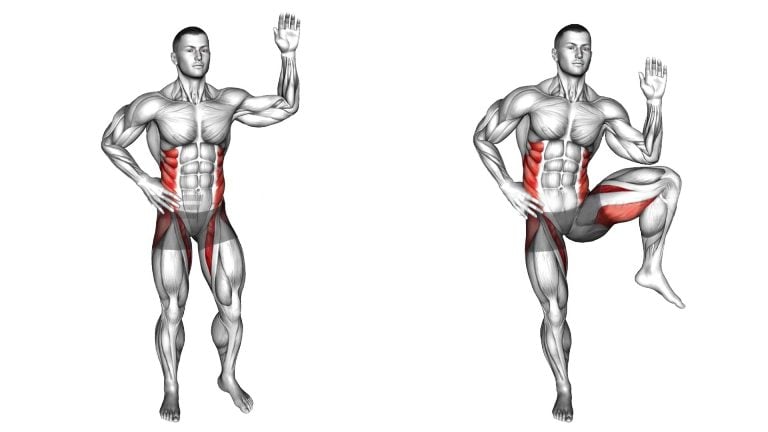
26. Plank To Toe Touch
The plank-to-toe touch is a variation of the traditional plank exercise that adds extra difficulty and engagement for your core and upper ab muscles.
This is a great move to add to your warm-up on upper body days since it helps increase blood flow, warms the body, activates the core, mobilizes the shoulders, and stretches the hamstrings.
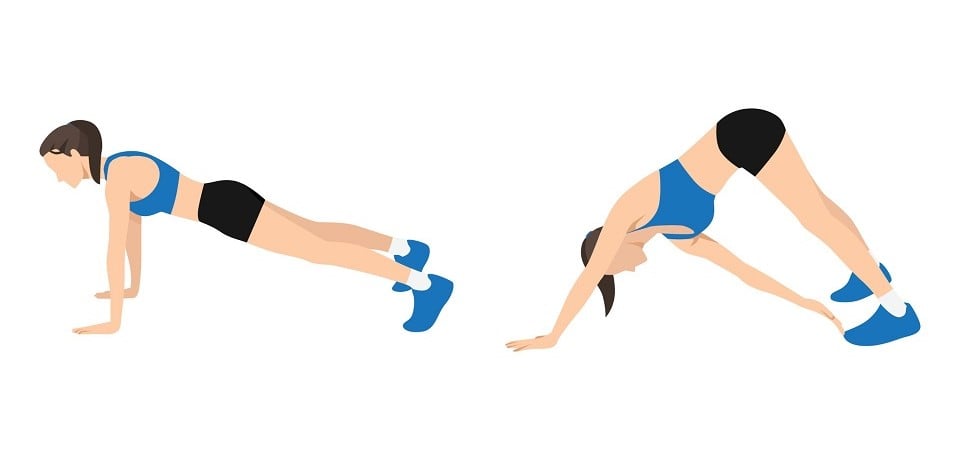
27. Bench Oblique Crunch
Oblique crunches with your feet on a bench are harder than regular floor crunches because you raise your feet, making the workout harder.
This variation focuses more on the oblique muscles.
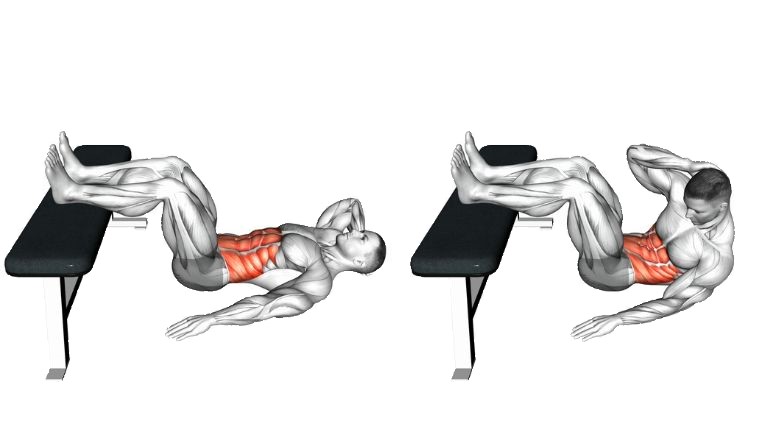
28. Dragon Flag
Dragon Flag, also known as the Dragon Fly, is an advanced core exercise primarily targeting the rectus abdominis, transverse abdominis, and obliques.
It also engages other muscle groups, such as the erector spinae, gluteal complex, hip flexors, adductors, latissimus dorsi, and more.
Bruce Lee, a martial artist and actor, popularised the technique.
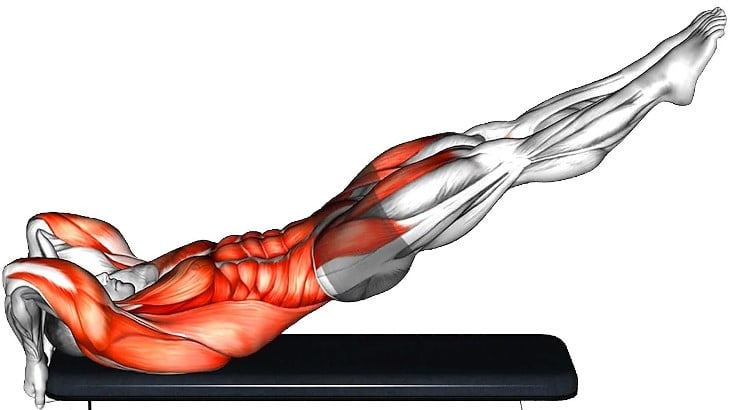
29. Seated Alternating Knee Tuck
The seated alternating knee tuck is an effective ab exercise that isolates the abs by using core strength to draw the knees up to the chest.
Pull one knee towards your chest and lean back a little to do this exercise. Then switch to the other knee and pedal like you’re doing a bike ride.
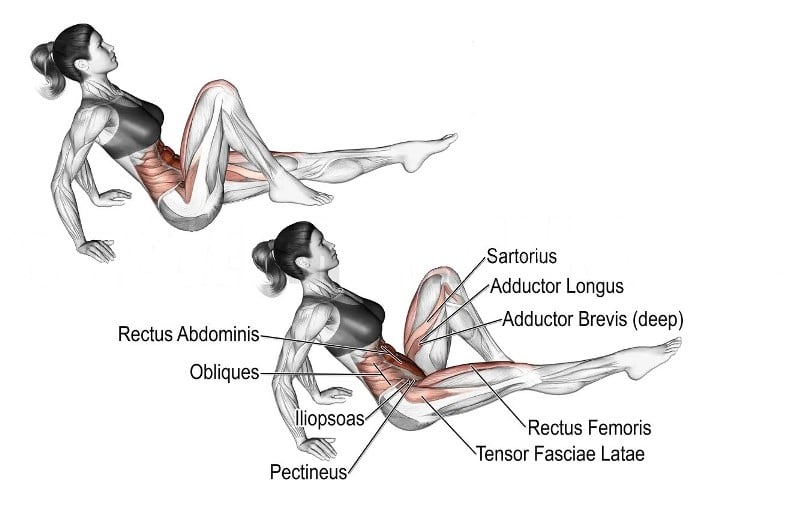
30. 21 Crunch
The alternation between sides promotes balanced core strength, which can improve overall stability.
This exercise can be done anywhere, as it requires no special equipment.
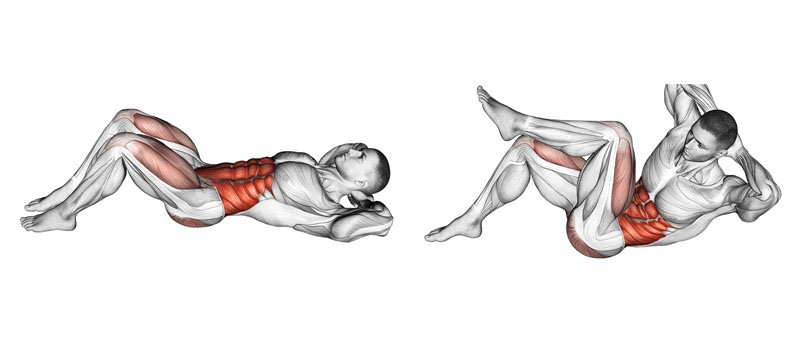

Manish is a NASM-certified fitness and nutrition coach with over 10 years of experience in weight lifting and fat loss fitness coaching. He specializes in gym-based training and has a lot of knowledge about exercise, lifting technique, biomechanics, and more.
Through “Fit Life Regime,” he generously shares the insights he’s gained over a decade in the field. His goal is to equip others with the knowledge to start their own fitness journey.
